Antiquity Studies
open access | peer reviewed
Aims & Scope
The series, directed by Lucio Milano, is devoted to the studies of the ancient and late-ancient world. It is intended for hosting both publications arising from the research activities of Ca’ Foscari and publications of Italian and foreign scholars and institutions that help to highlight the academic network of national and international collaborations in the field of Classical. It is divided into four sections: History and Epigraphy; Archeology; Oriental Studies; Philology and Literature.
Permalink doi.org | e-ISSN 2610-9344 | ISSN 2610-8828 | Language en, es, fr, it | ANCE E220779
Subseries
Archeologia
e-ISSN
2610-9344
ISSN
2610-8828
Filologia e letteratura
e-ISSN
2610-9352
ISSN
2610-8836
Storia ed epigrafia
e-ISSN
2610-8291
ISSN
2610-8801
Studi orientali
e-ISSN
2610-9336
ISSN
2610-881X
Copyright This is an open-access work distributed under the terms of the Creative Commons Attribution License (CC BY). The use, distribution or reproduction is permitted, provided that the original author(s) and the copyright owner(s) are credited and that the original publication is cited, in accordance with accepted academic practice. The license allows for commercial use. No use, distribution or reproduction is permitted which does not comply with these terms.
Latest published volume

- Luoghi di culto e ritualità in Oderzo antica
- Atti della giornata di studi (Oderzo, 24 maggio 2024)
- Marta Mascardi, Margherita Tirelli, Maria Cristina Vallicelli
- Dec. 18, 2025
Il volume accoglie gli atti della giornata di studi “Luoghi di culto e ritualità in Oderzo antica”, organizzata a Oderzo il 24 giugno 2024. I diversi contributi indagano, in un orizzonte diacronico di oltre 1000 anni, dal IX secolo a.C. all’VIII secolo d.C, le molteplici testimonianze, manufatti, monumenti e aree di culto della città antica. Il quadro complessivo delle realtà esaminate consente un’analisi della sfera del sacro nella sua duplice dimensione pubblica e privata, senza trascurare confronti e approfondimenti con l’intero panorama veneto e cisalpino.
- 2 download 0 search
- Commensality and Ceremonial Meals in the Neo-Assyrian Period
- Stefania Ermidoro
- Commensality and Ceremonial Meals in the Neo-Assyrian Period
- 1 download 268 search
- Introduzione
- Giorgia Baldacci
- The Protopalatial Building of the ‘Acropoli Mediana’ in Phaistos (Rooms CV-CVII)
- 21 download 238 search
- Microstorie di romanizzazione
- Patrizia Solinas
- Microstories of Romanization
- 17 download 273 search
- Commensality and Ceremonial Meals in the Neo-Assyrian Period
- Stefania Ermidoro
- Commensality and Ceremonial Meals in the Neo-Assyrian Period
- 8 download 282 search
- Introduction
- Maurizio Viano
- The Reception of Sumerian Literature in the Western Periphery
- 14 download 228 search
- Antichità egizie e Italia
- Emanuele Marcello Ciampini, Paola Zanovello
- Egyptian Antiquities and Italy
- 4 download 212 search
- Aspetti del sistema preposizionale dell’eblaita
- Maria Vittoria Tonietti
- Aspects of the Ablaita Prepositional System
- 10 download 251 search
- Poteri e legittimità nel mondo antico
- Stefania De Vido
- Powers and Legitimacy in the Ancient World
- 3 download 275 search
- Bibliography
- Maurizio Viano
- The Reception of Sumerian Literature in the Western Periphery
- 2 download 300 search
- Index of Cuneiform Sources
- Maurizio Viano
- The Reception of Sumerian Literature in the Western Periphery
- 2 download 278 search
- Ringraziamenti
- Giorgia Baldacci
- The Protopalatial Building of the ‘Acropoli Mediana’ in Phaistos (Rooms CV-CVII)
- 52 download 442 search
- Storia e storie della lingua greca
- Caterina Carpinato, Olga Tribulato
- History and Stories of the Greek Language
- 22 download 371 search
- La lupa sul Nilo
- Francesca Rohr Vio, Emanuele Marcello Ciampini
- The She-Wolf on the Nile
- 3 download 235 search
- Prefazione
- Filippo Maria Carinci
- The Protopalatial Building of the ‘Acropoli Mediana’ in Phaistos (Rooms CV-CVII)
- 7 download 331 search
- Abbreviazioni e tabella cronologica di riferimento
- Giorgia Baldacci
- The Protopalatial Building of the ‘Acropoli Mediana’ in Phaistos (Rooms CV-CVII)
- 13 download 266 search
- Festòs protopalaziale
- Ilaria Caloi
- Protopalatial Phaistos
- 3 download 268 search
- The Sumerian Literary Tradition at Emar and Ugarit
- Maurizio Viano
- The Reception of Sumerian Literature in the Western Periphery
- 6 download 299 search
- Abstract
- Giorgia Baldacci
- The Protopalatial Building of the ‘Acropoli Mediana’ in Phaistos (Rooms CV-CVII)
- 4 download 317 search
- La ceramica protopalaziale (e i manufatti in pietra)
- Giorgia Baldacci
- The Protopalatial Building of the ‘Acropoli Mediana’ in Phaistos (Rooms CV-CVII)
- 8 download 74 search
- Introduzione: per una storia della collezione epigrafica ostiense
- Epigrafia ostiense dopo il CIL. 2000 iscrizioni funerarie
- 3 download 105 search
- Appendice - Iscrizioni Perdute
- Epigrafia ostiense dopo il CIL. 2000 iscrizioni funerarie
- 3 download 313 search
- Unorthographic Writings
- Maurizio Viano
- The Reception of Sumerian Literature in the Western Periphery
- 3 download 292 search
- Abbreviations
- Maurizio Viano
- The Reception of Sumerian Literature in the Western Periphery
- 7 download 293 search
- Sumerian Literary and Magical Texts from Ḫattuša
- Maurizio Viano
- The Reception of Sumerian Literature in the Western Periphery
- 2 download 240 search
- Conclusions
- Maurizio Viano
- The Reception of Sumerian Literature in the Western Periphery
- 2 download 300 search
- Authors Index
- Erica Scarpa
- The City of Ebla
- 5 download 88 search
- Fonti edite
- Epigrafia ostiense dopo il CIL. 2000 iscrizioni funerarie
- 7 download 77 search
- Iscrizioni funerarie - Elementi onomastici 703-802
- Epigrafia ostiense dopo il CIL. 2000 iscrizioni funerarie
- 6 download 90 search
- Iscrizioni funerarie - Elementi onomastici 1000-1064
- Epigrafia ostiense dopo il CIL. 2000 iscrizioni funerarie
- 3 download 311 search
- L’Acropoli Mediana
- Giorgia Baldacci
- The Protopalatial Building of the ‘Acropoli Mediana’ in Phaistos (Rooms CV-CVII)
- 5 download 90 search
- Iscrizioni funerarie - Elementi onomastici 401-501
- Epigrafia ostiense dopo il CIL. 2000 iscrizioni funerarie
- 13 download 105 search
- Indici
- Epigrafia ostiense dopo il CIL. 2000 iscrizioni funerarie
- 2 download 256 search
- Appendice 1
- Stefano Masala
- The Protopalatial Building of the ‘Acropoli Mediana’ in Phaistos (Rooms CV-CVII)
- 8 download 286 search
- Middle Babylonian Sumerian Literary, Liturgical and Magical Texts
- Maurizio Viano
- The Reception of Sumerian Literature in the Western Periphery
- 6 download 82 search
- Iscrizioni funerarie - Elementi onomastici 603-702
- Epigrafia ostiense dopo il CIL. 2000 iscrizioni funerarie
- 5 download 65 search
- Bibliografia abbreviata
- Epigrafia ostiense dopo il CIL. 2000 iscrizioni funerarie
- 2 download 298 search
- Bibliografia
- Giorgia Baldacci
- The Protopalatial Building of the ‘Acropoli Mediana’ in Phaistos (Rooms CV-CVII)
- 10 download 79 search
- Supplemento – Revisioni e aggiunte
- Epigrafia ostiense dopo il CIL. 2000 iscrizioni funerarie
- 43 download 770 search
- De signis coeli and De ordine ac positione stellarum in signis
- Anna Santoni
- Certissima signa
- 0 download 271 search
- I depositi
- Giorgia Baldacci
- The Protopalatial Building of the ‘Acropoli Mediana’ in Phaistos (Rooms CV-CVII)
- 5 download 111 search
- Iscrizioni funerarie - Elementi onomastici 202-301
- Epigrafia ostiense dopo il CIL. 2000 iscrizioni funerarie
- 7 download 74 search
- Iscrizioni funerarie - Elementi onomastici 903-999
- Epigrafia ostiense dopo il CIL. 2000 iscrizioni funerarie
- 4 download 60 search
- Corrispondenze inventariali
- Epigrafia ostiense dopo il CIL. 2000 iscrizioni funerarie
- 5 download 223 search
- Corpora of Sumerian Literary Texts from the Western Periphery
- Maurizio Viano
- The Reception of Sumerian Literature in the Western Periphery
- 9 download 348 search
- Sumerian Literary and Magical Texts from Ugarit
- Maurizio Viano
- The Reception of Sumerian Literature in the Western Periphery
- 5 download 73 search
- Iscrizioni funerarie - Elementi onomastici 502-602
- Epigrafia ostiense dopo il CIL. 2000 iscrizioni funerarie
- 9 download 318 search
- Introduction
- Erica Scarpa
- The City of Ebla
- 12 download 81 search
- Iscrizioni funerarie - Elementi onomastici 101-201
- Epigrafia ostiense dopo il CIL. 2000 iscrizioni funerarie
- 7 download 87 search
- Iscrizioni funerarie - Elementi onomastici 803-902
- Epigrafia ostiense dopo il CIL. 2000 iscrizioni funerarie
- 7 download 343 search
- Le strutture e la ceramica in contesto
- Giorgia Baldacci
- The Protopalatial Building of the ‘Acropoli Mediana’ in Phaistos (Rooms CV-CVII)
- 8 download 75 search
- Iscrizioni funerarie – Frammenti
- Epigrafia ostiense dopo il CIL. 2000 iscrizioni funerarie
- 12 download 100 search
- Premessa alla seconda edizione
- Epigrafia ostiense dopo il CIL. 2000 iscrizioni funerarie
- 1 download 250 search
- Elenco delle figure e delle tavole
- Giorgia Baldacci
- The Protopalatial Building of the ‘Acropoli Mediana’ in Phaistos (Rooms CV-CVII)
- 4 download 337 search
- Le strutture e la sequenza stratigrafica
- Giorgia Baldacci
- The Protopalatial Building of the ‘Acropoli Mediana’ in Phaistos (Rooms CV-CVII)
- 12 download 298 search
- Bibliography
- Erica Scarpa
- The City of Ebla
- 6 download 79 search
- Iscrizioni funerarie - Elementi onomastici 302-400
- Epigrafia ostiense dopo il CIL. 2000 iscrizioni funerarie
- 14 download 87 search
- Iura Sepulchrorum
- Epigrafia ostiense dopo il CIL. 2000 iscrizioni funerarie
- 1 download 285 search
- Acknowledgments
- Maurizio Viano
- The Reception of Sumerian Literature in the Western Periphery
- 7 download 87 search
- Carmina
- Epigrafia ostiense dopo il CIL. 2000 iscrizioni funerarie
- 9 download 292 search
- Sumerian Literary and Magical Texts from Emar
- Maurizio Viano
- The Reception of Sumerian Literature in the Western Periphery
- 1 download 322 search
- Epilogo
- Giorgia Baldacci
- The Protopalatial Building of the ‘Acropoli Mediana’ in Phaistos (Rooms CV-CVII)
- 9 download 278 search
- Middle Assyrian Sumerian Literary, Liturgical and Magical Texts
- Maurizio Viano
- The Reception of Sumerian Literature in the Western Periphery
- 4 download 246 search
- Tavole
- Giorgia Baldacci
- The Protopalatial Building of the ‘Acropoli Mediana’ in Phaistos (Rooms CV-CVII)
- 1 download 247 search
- Appendice 2
- Giorgia Baldacci
- The Protopalatial Building of the ‘Acropoli Mediana’ in Phaistos (Rooms CV-CVII)
- 10 download 81 search
- Iscrizioni funerarie - Elementi onomastici 1-100
- Epigrafia ostiense dopo il CIL. 2000 iscrizioni funerarie
- 4 download 252 search
- The Sumerian Literary Tradition at Ḫattuša
- Maurizio Viano
- The Reception of Sumerian Literature in the Western Periphery
- 5 download 85 search
- Iscrizioni funerarie - Elementi onomastici - frammenti
- Epigrafia ostiense dopo il CIL. 2000 iscrizioni funerarie
- 3 download 28 search
- Le iscrizioni sacre di Opitergium romana
- Lorenzo Calvelli, Sabrina Pesce
- Dec. 18, 2025 | Luoghi di culto e ritualità in Oderzo antica
- 3 download 38 search
- Da Eppone a Magno: i vescovi della diocesi di Oderzo tra mito, racconti, documenti e dati archeologici
- Elisa Possenti
- Dec. 18, 2025 | Luoghi di culto e ritualità in Oderzo antica
- 3 download 27 search
- I cippi terminali iscritti in Veneto: nuove evidenze da Oderzo
- Anna Marinetti
- Dec. 18, 2025 | Luoghi di culto e ritualità in Oderzo antica
- 2 download 33 search
- Sacra privata ad Opitergium tra attestazioni e attribuzioni
- Marta Mascardi
- Dec. 18, 2025 | Luoghi di culto e ritualità in Oderzo antica
- 5 download 34 search
- Edifici di culto a Opitergium: tracce e suggestioni
- Margherita Tirelli, Francesca Ferrarini
- Dec. 18, 2025 | Luoghi di culto e ritualità in Oderzo antica
- 3 download 23 search
- Alcuni aspetti del culto domestico in Cisalpina
- Margherita Bolla
- Dec. 18, 2025 | Luoghi di culto e ritualità in Oderzo antica
- 1 download 29 search
- Il sacro a Opitergium: note conclusive
- Giovannella Cresci Marrone
- Dec. 18, 2025 | Luoghi di culto e ritualità in Oderzo antica
- 3 download 24 search
- Un grande edificio per un banchetto senza fine (VIII-VI secolo a.C.)
- Giovanna Gambacurta, Angela Ruta Serafini
- Dec. 18, 2025 | Luoghi di culto e ritualità in Oderzo antica
- 6 download 35 search
- Il complesso sacro dell’area dell’ex stadio di Oderzo
- Giuliana Cavalieri Manasse, Furio Sacchi
- Dec. 18, 2025 | Luoghi di culto e ritualità in Oderzo antica
- 6 download 36 search
- Evolution and Religious Transformation in the Sanctuaries in Celtiberia of Duero
- Santiago Martínez Caballero, Juan Santos Yanguas
- Sept. 24, 2025 | Writing and Religious Traditions in the Ancient Western Mediterranean
- 28 download 111 search
- From Equi to Romans. Processes of Religious ‘Romanisation’
- Maria Cristina Biella, Federico Corradi
- Sept. 24, 2025 | Writing and Religious Traditions in the Ancient Western Mediterranean
- 15 download 83 search
- Minerva, Camuni and Romans: The Three ‘Faces’ of the Triangular Votive Altar from Breno (BS)
- Sofia Comini, Francesca Corsi, Marco Vittorio Pezzolo, Cecilia Silvestrin
- Sept. 24, 2025 | Writing and Religious Traditions in the Ancient Western Mediterranean
- 10 download 41 search
- One God... Many Names. Etruscan Deities and Devotees in the Therapeutic Sanctuary of San Casciano dei Bagni
- Adriano Maggiani
- Sept. 24, 2025 | Writing and Religious Traditions in the Ancient Western Mediterranean
- 19 download 79 search
- One God... Many Names. Roman Deities and Devotees in the Therapeutic Sanctuary of San Casciano dei Bagni
- Gian Luca Gregori
- Sept. 24, 2025 | Writing and Religious Traditions in the Ancient Western Mediterranean
- 11 download 59 search
- Religions and Writing in the Ancient Western Mediterranean: Global Perspectives and Local Practices
- Sylvia Estienne
- Sept. 24, 2025 | Writing and Religious Traditions in the Ancient Western Mediterranean
- 12 download 55 search
- Rural Shrines and Writing Practices: The Case of the Shrine of Iuppiter Aeternus in Villanuova sul Clisi (Valle Sabbia – BS)
- Serena Solano, Gian Luca Gregori, Alfredo Buonopane
- Sept. 24, 2025 | Writing and Religious Traditions in the Ancient Western Mediterranean
- 6 download 45 search
- The Integration of Local Deities into Civic Pantheons in the Spanish Northwest: Some Examples
- María Cruz González-Rodríguez
- Sept. 24, 2025 | Writing and Religious Traditions in the Ancient Western Mediterranean
- 6 download 42 search
- The Politeic Inscriptions of Hispania Citerior: Between Personal Devotion and Political Propaganda
- María Dolores Dopico Caínzos, Armando Redentor
- Sept. 24, 2025 | Writing and Religious Traditions in the Ancient Western Mediterranean
- 8 download 66 search
- The Sanctuary of Astarte at Ras il-Wardija in Gozo (Malta) Between Carthage and Rome
- Federica Spagnoli, Giuliana Bonanno, Tecla Zucchi
- Sept. 24, 2025 | Writing and Religious Traditions in the Ancient Western Mediterranean
- 16 download 70 search
- Ricomporre la scena cultuale: fonti documentarie plurime e contributo dell’archeologia per lo studio dei luoghi di culto romani
- Olivier de Cazanove
- Sept. 24, 2025 | Writing and Religious Traditions in the Ancient Western Mediterranean
- 5 download 57 search
- Writing and Religious Traditions: A Multifaceted Relationship
- Lorenzo Calvelli, María Dolores Dopico Caínzos
- Sept. 24, 2025 | Writing and Religious Traditions in the Ancient Western Mediterranean
- 0 download 49 search
- Prefazione
- June 24, 2025 | L’edilizia Kura-Araxes tra IV e III millennio: uno studio regionale
- 1 download 42 search
- 5 • Conclusioni
- June 24, 2025 | L’edilizia Kura-Araxes tra IV e III millennio: uno studio regionale
- 4 download 47 search
- 3 • Edilizia
- June 24, 2025 | L’edilizia Kura-Araxes tra IV e III millennio: uno studio regionale
- 1 download 42 search
- 2 • I siti
- June 24, 2025 | L’edilizia Kura-Araxes tra IV e III millennio: uno studio regionale
- 3 download 53 search
- 1 • I lineamenti
- June 24, 2025 | L’edilizia Kura-Araxes tra IV e III millennio: uno studio regionale
- 3 download 39 search
- 4 • Analisi delle evidenze
- June 24, 2025 | L’edilizia Kura-Araxes tra IV e III millennio: uno studio regionale
- 6 download 95 search
- 7 • Appendix
- Dec. 18, 2024 | The Akkadian Great Hymns and Prayers
- 39 download 162 search
- 2 • The Great Prayer to Nabû
- Dec. 18, 2024 | The Akkadian Great Hymns and Prayers
- 23 download 129 search
- 3 • The Great Prayer to Ištar
- Dec. 18, 2024 | The Akkadian Great Hymns and Prayers
- 4 download 78 search
- 6 • Conclusions
- Dec. 18, 2024 | The Akkadian Great Hymns and Prayers
- 18 download 143 search
- 1 • Introduction
- Dec. 18, 2024 | The Akkadian Great Hymns and Prayers
- 7 download 95 search
- Glossary
- Dec. 18, 2024 | The Akkadian Great Hymns and Prayers
- 7 download 108 search
- 4 • A Mosaic of Quotations: Intertextual Relationships in the Great Hymns and Prayers
- Dec. 18, 2024 | The Akkadian Great Hymns and Prayers
- 11 download 84 search
- 5 • Rhetorical Devices and Poetic Language of the Great Hymns and Prayers
- Dec. 18, 2024 | The Akkadian Great Hymns and Prayers
- 11 download 105 search
- 3 • The Neolithization as Seen from the East
- Dec. 6, 2024 | Modelling the Rhythm of Neolithisation Between the Carpathians and the Dnieper River
- 11 download 108 search
- 4 • The Neolithization: A Micro-Regional Approach
- Dec. 6, 2024 | Modelling the Rhythm of Neolithisation Between the Carpathians and the Dnieper River
- 5 download 101 search
- 1 • Who’s Indigenous Here? Disentangling ‘Mesolithic Prelude’
- Dec. 6, 2024 | Modelling the Rhythm of Neolithisation Between the Carpathians and the Dnieper River
- 18 download 140 search
- 2 • Ceramic Mesolithic, Sub-Neolithic, Para-Neolithic Hunter-Gatherers in Availability Phase: Searching for a Definition for the Obvious
- Dec. 6, 2024 | Modelling the Rhythm of Neolithisation Between the Carpathians and the Dnieper River
- 6 download 97 search
- 5 • Conclusion
- Dec. 6, 2024 | Modelling the Rhythm of Neolithisation Between the Carpathians and the Dnieper River
- 9 download 104 search
- Introduction
- Dec. 6, 2024 | Modelling the Rhythm of Neolithisation Between the Carpathians and the Dnieper River
- 16 download 159 search
- Introduction
- Claudia Antonetti, Bryan De Notariis, Marco Enrico
- Oct. 8, 2024 | Wine Cultures
- 26 download 173 search
- Wine in Achaemenid Arachosia
- Prabhjeet K. Johal
- Oct. 8, 2024 | Wine Cultures
- 21 download 153 search
- Intoxicating Nectars of Plenty
- James McHugh
- Oct. 8, 2024 | Wine Cultures
- 20 download 159 search
- Wine in the Gandhāran Epigraphic Corpus
- Stefan Baums
- Oct. 8, 2024 | Wine Cultures
- 66 download 341 search
- Wine in Gandhāra
- Omar Coloru, Elisa Iori, Luca M. Olivieri
- Oct. 8, 2024 | Wine Cultures
- 31 download 192 search
- Beyond the Form
- Cristiano Moscatelli, Anna Filigenzi
- Oct. 8, 2024 | Wine Cultures
- 31 download 198 search
- An Assyrian Winery in Khinis, Ancient Khanusa (Kurdistan Region of Iraq)
- Francesca Simi, Costanza Coppini, Daniele Morandi Bonacossi
- Oct. 8, 2024 | Wine Cultures
- 19 download 197 search
- Wine in India and Other Substances
- Stefano Beggiora
- Oct. 8, 2024 | Wine Cultures
- 35 download 216 search
- Wine, Women and Royalty in Gandhāra
- Claudia Antonetti
- Oct. 8, 2024 | Wine Cultures
- 22 download 154 search
- In Search of Regional/Local (deśī) Words for ‘Intoxicant’ in First-Millennium India
- Andrea Drocco
- Oct. 8, 2024 | Wine Cultures
- 22 download 181 search
- The Archaeology of Wine in the Southern Caucasus
- Elena Rova
- Oct. 8, 2024 | Wine Cultures
- 59 download 245 search
- The Gandhāric Roots of the Indian Symposion and Sympotic-like Elements in Buddhist Literature
- Bryan De Notariis
- Oct. 8, 2024 | Wine Cultures
- 22 download 205 search
- Strabo on Wine in Ancient India
- Marco Enrico
- Oct. 8, 2024 | Wine Cultures
- 13 download 132 search
- 3 • Conclusions
- July 18, 2024 | The Necessary Anomaly
- 16 download 160 search
- Introduction
- July 18, 2024 | The Necessary Anomaly
- 19 download 159 search
- 2 • Des femmes dangereuses
- July 18, 2024 | The Necessary Anomaly
- 31 download 191 search
- 1 • Les femmes grecques et leurs représentations
- July 18, 2024 | The Necessary Anomaly
- 9 download 214 search
- Female Advisors Between East and West
- Jakub Kuciak, Sebastian Fink
- July 9, 2024 | Wisdom Between East and West: Mesopotamia, Greece and Beyond
- 10 download 147 search
- The Rational Roots of Medical Science Between Greece and Egypt
- Nicola Reggiani
- July 9, 2024 | Wisdom Between East and West: Mesopotamia, Greece and Beyond
- 29 download 274 search
- Proverbs and Gnōmai in the Epic of Gilgamesh
- Bernardo Ballesteros
- July 9, 2024 | Wisdom Between East and West: Mesopotamia, Greece and Beyond
- 16 download 213 search
- King, Sage, Scribe, and Priest: Seleucid Uruk and Jerusalem in Perspective
- Stephanié Anthonioz
- July 9, 2024 | Wisdom Between East and West: Mesopotamia, Greece and Beyond
- 22 download 215 search
- Proverbs and Wisdom Traditions in Archaic Greek Culture
- Andrea Ercolani
- July 9, 2024 | Wisdom Between East and West: Mesopotamia, Greece and Beyond
- 35 download 205 search
- Truth and Falsehood in Mesopotamia and Greece: Similarities and Differences
- Francesco Sironi, Maurizio Viano
- July 9, 2024 | Wisdom Between East and West: Mesopotamia, Greece and Beyond
- 9 download 159 search
- Introduction
- Francesco Sironi, Maurizio Viano
- July 9, 2024 | Wisdom Between East and West: Mesopotamia, Greece and Beyond
- 14 download 140 search
- From Dialogue to Debate
- Simonetta Ponchia
- July 9, 2024 | Wisdom Between East and West: Mesopotamia, Greece and Beyond
- 17 download 146 search
- Law, Morality, and Subversion in Sumerian Prose Miniatures
- Jana Matuszak
- July 9, 2024 | Wisdom Between East and West: Mesopotamia, Greece and Beyond
- 15 download 209 search
- An Epistemological Perspective on the Mesopotamian Wisdom Tradition
- Giorgio Buccellati
- July 9, 2024 | Wisdom Between East and West: Mesopotamia, Greece and Beyond
- 33 download 192 search
- Sumerian Proverbs as Wisdom Literature
- Niek Veldhuis
- July 9, 2024 | Wisdom Between East and West: Mesopotamia, Greece and Beyond
- 29 download 230 search
- Astronomy, Ṭupšarrūtu, and Knowledge in the Cuneiform World
- Francesca Rochberg
- July 9, 2024 | Wisdom Between East and West: Mesopotamia, Greece and Beyond
- 11 download 188 search
- The Limit of Transmission
- Yoram Cohen
- July 9, 2024 | Wisdom Between East and West: Mesopotamia, Greece and Beyond
- 14 download 321 search
- Dance in Hittite Culture: Choreography and Setting
- Stefano de Martino
- July 9, 2024 | Wisdom Between East and West: Mesopotamia, Greece and Beyond
- 19 download 200 search
- Wise Man and Poet in Ancient Greece: Features and Overlaps
- Massimiliano Ornaghi
- July 9, 2024 | Wisdom Between East and West: Mesopotamia, Greece and Beyond
- 12 download 140 search
- 2 • Il corpo umano in antico Egitto
- June 26, 2024 | The Broken Body
- 10 download 126 search
- 1 • Introduzione
- June 26, 2024 | The Broken Body
- 3 download 119 search
- 5 • La cornice
- June 26, 2024 | The Broken Body
- 14 download 140 search
- 4 • Il corpo umano nei Testi delle Piramidi
- June 26, 2024 | The Broken Body
- 9 download 128 search
- 3 • Il corpo umano nella letteratura funeraria
- June 26, 2024 | The Broken Body
- 4 download 82 search
- 6 • Conclusioni (o ripartenze)
- June 26, 2024 | The Broken Body
- 10 download 125 search
- Premessa
- June 26, 2024 | The Broken Body
- 8 download 189 search
- De la curiosité locale à l’intégration méditerranéenne : mythes et cultes siciliens chez Diodore
- Cécile Durvye
- Dec. 19, 2023 | Un monde partagé : la Sicile du premier siècle av. J.-C. entre Diodore et Cicéron
- 3 download 138 search
- Diodore et les monuments d’Agrigente : la réversibilité des signes
- Renaud Robert
- Dec. 19, 2023 | Un monde partagé : la Sicile du premier siècle av. J.-C. entre Diodore et Cicéron
- 11 download 178 search
- Moralising and Immersive Big Man History
- Lisa Irene Hau
- Dec. 19, 2023 | Un monde partagé : la Sicile du premier siècle av. J.-C. entre Diodore et Cicéron
- 5 download 150 search
- Les monuments et les erga de Sicile dans le corpus cicéronien
- Robinson Baudry
- Dec. 19, 2023 | Un monde partagé : la Sicile du premier siècle av. J.-C. entre Diodore et Cicéron
- 14 download 138 search
- La géographie de la Sicile dans la Bibliothèque historique de Diodore de Sicile
- Roberto Sammartano
- Dec. 19, 2023 | Un monde partagé : la Sicile du premier siècle av. J.-C. entre Diodore et Cicéron
- 13 download 173 search
- La géographie de la Sicile dans les Verrines
- Cristina Soraci
- Dec. 19, 2023 | Un monde partagé : la Sicile du premier siècle av. J.-C. entre Diodore et Cicéron
- 13 download 161 search
- Diodore, Cicéron et la Sicile : introduction
- Stefania De Vido, Cécile Durvye
- Dec. 19, 2023 | Un monde partagé : la Sicile du premier siècle av. J.-C. entre Diodore et Cicéron
- 7 download 159 search
- La religion des autres. Regard cicéronien sur les cultes de Sicile
- Sabine Luciani
- Dec. 19, 2023 | Un monde partagé : la Sicile du premier siècle av. J.-C. entre Diodore et Cicéron
- 10 download 149 search
- Il piccolo Verre e i grandi uomini della Sicilia
- Luca Fezzi
- Dec. 19, 2023 | Un monde partagé : la Sicile du premier siècle av. J.-C. entre Diodore et Cicéron
- 25 download 217 search
- I recinti funerari della necropoli romana di Oderzo. I dati dai contesti di scavo
- Maria Cristina Vallicelli
- May 30, 2023 | Opitergium Necropolis
- 19 download 219 search
- Strumenti scrittori in contesti funerari dell’Italia settentrionale
- Margherita Bolla
- May 30, 2023 | Opitergium Necropolis
- 21 download 184 search
- L’ombra dei gesti. Dal dato materiale alla ricostruzione del rito
- Cecilia Rossi
- May 30, 2023 | Opitergium Necropolis
- 22 download 203 search
- L’insolito secchio di Oderzo
- Luca Zaghetto
- May 30, 2023 | Opitergium Necropolis
- 29 download 211 search
- L’anima delle cose. Riti e corredi dalla necropoli romana di Opitergium
- Marta Mascardi
- May 30, 2023 | Opitergium Necropolis
- 18 download 177 search
- Spolia dalla necropoli opitergina: monumenta
- Margherita Tirelli
- May 30, 2023 | Opitergium Necropolis
- 20 download 143 search
- Spolia dalla necropoli opitergina: scripta
- Giovannella Cresci Marrone
- May 30, 2023 | Opitergium Necropolis
- 30 download 186 search
- Sepolture altomedievali di Oderzo, status quaestionis e problemi aperti
- Elisa Possenti
- May 30, 2023 | Opitergium Necropolis
- 3 download 170 search
- Una nuova lettura del morso equino della tomba 2141 di Santa Lucia di Tolmino/Most na Soči (scavi Marchesetti)
- Giuliano Righi †
- Dec. 16, 2022 | Son of the Flash, Worthy of a King. A Veneto Horse and its Harness
- 7 download 207 search
- Nella vita del Museo: un esempio di valorizzazione in itinere
- Marta Mascardi
- Dec. 16, 2022 | Son of the Flash, Worthy of a King. A Veneto Horse and its Harness
- 17 download 229 search
- Sepolture equine e strutture funerarie nel Veneto antico
- Fiorenza Bortolami
- Dec. 16, 2022 | Son of the Flash, Worthy of a King. A Veneto Horse and its Harness
- 10 download 198 search
- La necropoli dell’Opera Pia Moro di Oderzo: dalle indagini alle prospettive di ricerca
- Giovanna Gambacurta, Angela Ruta Serafini
- Dec. 16, 2022 | Son of the Flash, Worthy of a King. A Veneto Horse and its Harness
- 9 download 201 search
- La bardatura della tomba 49, dallo scavo al museo
- Martino Serafini
- Dec. 16, 2022 | Son of the Flash, Worthy of a King. A Veneto Horse and its Harness
- 16 download 228 search
- Il sito di culto di Bizjakova hiša a Kobarid (Slovenia occidentale)
- Teja Gerbec, Miha Mlinar
- Dec. 16, 2022 | Son of the Flash, Worthy of a King. A Veneto Horse and its Harness
- 6 download 181 search
- La sepoltura equina 49 dell’Opera Pia Moro e la sua bardatura
- Veronica Groppo
- Dec. 16, 2022 | Son of the Flash, Worthy of a King. A Veneto Horse and its Harness
- 13 download 162 search
- Finimenti e morsi equini nell’Arte delle situle
- Luca Zaghetto
- Dec. 16, 2022 | Son of the Flash, Worthy of a King. A Veneto Horse and its Harness
- 13 download 198 search
- Analisi archeozoologica e restauro del cavallo della tomba 49
- Paolo Reggiani
- Dec. 16, 2022 | Son of the Flash, Worthy of a King. A Veneto Horse and its Harness
- 3 download 180 search
- Da Pisaurum alla IX regio: l’esordio di Giovannella Cresci Marrone nell’epigrafia militante
- Giovanni Mennella
- Feb. 4, 2022 | Libertatis dulcedo
- 12 download 200 search
- Giovannella Cresci Marrone e l’epigrafe del Veneto romano
- Alfredo Buonopane
- Feb. 4, 2022 | Libertatis dulcedo
- 11 download 130 search
- Giovannella Cresci Marrone e alcune sue idee per l’università
- Lucio Milano
- Feb. 4, 2022 | Libertatis dulcedo
- 14 download 203 search
- Bibliografia di Giovannella Cresci Marrone dal 1977 al 2021
- Feb. 4, 2022 | Libertatis dulcedo
- 6 download 176 search
- Giovannella Cresci Marrone, Erodoto, Temistocle e l’impero ateniese
- Nino Luraghi
- Feb. 4, 2022 | Libertatis dulcedo
- 27 download 224 search
- Giovannella Cresci Marrone e la transizione dal mondo preromano alla romanità (e altro)
- Anna Marinetti
- Feb. 4, 2022 | Libertatis dulcedo
- 6 download 180 search
- Giovannella Cresci Marrone e l’epigrafia del sacro
- Federica Fontana
- Feb. 4, 2022 | Libertatis dulcedo
- 3 download 188 search
- Giovannella Cresci Marrone e le attività di insegnamento sul campo
- Tomaso Maria Lucchelli
- Feb. 4, 2022 | Libertatis dulcedo
- 9 download 158 search
- Giovannella Cresci Marrone e l’eredità dell’Antico in autori moderni
- Gino Bandelli
- Feb. 4, 2022 | Libertatis dulcedo
- 5 download 147 search
- Torino e l’area subalpina: Giovannella Cresci Marrone e l’epigrafia ‘povera’
- Enrica Culasso Gastaldi
- Feb. 4, 2022 | Libertatis dulcedo
- 9 download 157 search
- Giovannella Cresci Marrone e la storia politica dell’età triumvirale e augustea
- Francesca Cenerini
- Feb. 4, 2022 | Libertatis dulcedo
- 10 download 219 search
- Giovannella Cresci Marrone e il buon uso delle fonti
- Elvira Migliario
- Feb. 4, 2022 | Libertatis dulcedo
- 17 download 236 search
- Giovannella Cresci Marrone e il Dipartimento di Studi Umanistici
- Paolo Eleuteri
- Feb. 4, 2022 | Libertatis dulcedo
- 30 download 222 search
- Il nostro Maestro e noi
- Lorenzo Calvelli, Franco Luciani, Antonio Pistellato, Francesca Rohr Vio, Alessandra Valentini
- Feb. 4, 2022 | Libertatis dulcedo
- 15 download 225 search
- Giovannella Cresci Marrone e Altino
- Margherita Tirelli
- Feb. 4, 2022 | Libertatis dulcedo
- 20 download 282 search
- Giovannella Cresci Marrone, Alessandro Magno e l’imitatio Alexandri
- Cinzia Bearzot
- Feb. 4, 2022 | Libertatis dulcedo
- 26 download 454 search
- Fasce e prodigi. Pindaro e l'inno omerico a Hermes
- Maria Cannatà Fera
- Dec. 16, 2021 | ΦΑΙΔΙΜΟΣ ΕΚΤΩΡ
- 64 download 515 search
- Una storia della musica e della lirica greca dalle origini al IV secolo a.C. nel De musica attribuito a Plutarco
- Antonietta Gostoli
- Dec. 16, 2021 | ΦΑΙΔΙΜΟΣ ΕΚΤΩΡ
- 26 download 426 search
- Un cavallo nell’Elisio (Auson. Epigr. 7 Green)
- Luca Mondin
- Dec. 16, 2021 | ΦΑΙΔΙΜΟΣ ΕΚΤΩΡ
- 20 download 343 search
- Pind. fr. 321 Sn.-Maehl. delendum
- Stefano Vecchiato
- Dec. 16, 2021 | ΦΑΙΔΙΜΟΣ ΕΚΤΩΡ
- 11 download 380 search
- P.Vindob. G 26768a: Non-Antimachean Thebaid (with Possible Associated Fragments from Other Collections)
- Marco Perale
- Dec. 16, 2021 | ΦΑΙΔΙΜΟΣ ΕΚΤΩΡ
- 41 download 444 search
- ἀφθόνητος αἶνος
- Olga Tribulato
- Dec. 16, 2021 | ΦΑΙΔΙΜΟΣ ΕΚΤΩΡ
- 25 download 373 search
- Aesch. Eum. vv. 490-565: studio sull’epiploke e sulle variazioni metrico-ritmiche
- Liana Lomiento
- Dec. 16, 2021 | ΦΑΙΔΙΜΟΣ ΕΚΤΩΡ
- 27 download 456 search
- Typhoeus and Etna in Hesiod, Pindar, and (Pseudo-)Aeschylus
- Bruno Currie
- Dec. 16, 2021 | ΦΑΙΔΙΜΟΣ ΕΚΤΩΡ
- 1 download 69 search
- Prefazione
- Enrico Emanuele Prodi, Stefano Vecchiato
- Dec. 16, 2021 | ΦΑΙΔΙΜΟΣ ΕΚΤΩΡ
- 17 download 393 search
- À l’arrivée de Molon : sur un calembour mécompris chez Strabon (14.2.13 C655)
- Aude Cohen-Skalli
- Dec. 16, 2021 | ΦΑΙΔΙΜΟΣ ΕΚΤΩΡ
- 5 download 428 search
- Ovid and the Ass (Fast. 1.391-440, 6.319-46)
- Myrto Garani
- Dec. 16, 2021 | ΦΑΙΔΙΜΟΣ ΕΚΤΩΡ
- 28 download 344 search
- Bacchylides Playing Tragic
- Theodora A. Hadjimichael
- Dec. 16, 2021 | ΦΑΙΔΙΜΟΣ ΕΚΤΩΡ
- 9 download 259 search
- Apollon Pythien chez Pindare
- Nadine Le Meur
- Dec. 16, 2021 | ΦΑΙΔΙΜΟΣ ΕΚΤΩΡ
- 35 download 292 search
- The Sublime in Motion: Longinus, Freud, and Embedded Metaphors
- Alessandro Schiesaro
- Dec. 16, 2021 | ΦΑΙΔΙΜΟΣ ΕΚΤΩΡ
- 55 download 372 search
- Ogni epoca ha la sua guerra di Troia
- Caterina Carpinato
- Dec. 16, 2021 | ΦΑΙΔΙΜΟΣ ΕΚΤΩΡ
- 11 download 303 search
- Athenaeus and Hellenistic Epigram
- Ewen Bowie
- Dec. 16, 2021 | ΦΑΙΔΙΜΟΣ ΕΚΤΩΡ
- 16 download 445 search
- Perieci di Cirene
- Stefania De Vido
- Dec. 16, 2021 | ΦΑΙΔΙΜΟΣ ΕΚΤΩΡ
- 21 download 301 search
- Paris’ μαχλοσύνη, a Mistranslated Aeschylean Fragment, and the Meanings of μάχλος (Hom. Il. 24.30, Aesch. fr. 325 Radt)
- Albio Cassio
- Dec. 16, 2021 | ΦΑΙΔΙΜΟΣ ΕΚΤΩΡ
- 29 download 401 search
- A Hesiodic Heldendämmerung: Some Textual Problems and Reconstructions
- Thomas Coward
- Dec. 16, 2021 | ΦΑΙΔΙΜΟΣ ΕΚΤΩΡ
- 17 download 457 search
- Fato e maledizione nell’Antigone di Sofocle
- Marco Dorati
- Dec. 16, 2021 | ΦΑΙΔΙΜΟΣ ΕΚΤΩΡ
- 9 download 297 search
- Forgotten Scholarship: Gustav Adolf Schöll, Herodotus, and Greek Oracular Poetry
- Maurizio Giangiulio
- Dec. 16, 2021 | ΦΑΙΔΙΜΟΣ ΕΚΤΩΡ
- 18 download 280 search
- A Forgotten Piece of the Theban Saga?
- Ilaria Andolfi
- Dec. 16, 2021 | ΦΑΙΔΙΜΟΣ ΕΚΤΩΡ
- 11 download 337 search
- Δύνασαι πάλιν αὐτὸν ἐγεῖραι
- Alice Franceschini
- Dec. 16, 2021 | ΦΑΙΔΙΜΟΣ ΕΚΤΩΡ
- 26 download 330 search
- Socrates in Love (Herodicus Suppl. Hell. 495)
- Richard Hunter
- Dec. 16, 2021 | ΦΑΙΔΙΜΟΣ ΕΚΤΩΡ
- 18 download 322 search
- Theognis’ Unoriginal Didactic Failure
- Henry Spelman
- Dec. 16, 2021 | ΦΑΙΔΙΜΟΣ ΕΚΤΩΡ
- 34 download 321 search
- Pyrwias Leading the Dance
- David Sider
- Dec. 16, 2021 | ΦΑΙΔΙΜΟΣ ΕΚΤΩΡ
- 43 download 569 search
- Il cerilo di Alcmane tra Aristofane, Antigono, Eufronio e Didimo
- Federica Benuzzi
- Dec. 16, 2021 | ΦΑΙΔΙΜΟΣ ΕΚΤΩΡ
- 17 download 317 search
- A Night in Cyprus (Verg. Aen. 1.657-697)
- Alessandro Barchiesi
- Dec. 16, 2021 | ΦΑΙΔΙΜΟΣ ΕΚΤΩΡ
- 50 download 505 search
- A Boeotian Poem in PSI X 1174: Some Considerations
- Giovan Battista D’Alessio, Lucia Prauscello
- Dec. 16, 2021 | ΦΑΙΔΙΜΟΣ ΕΚΤΩΡ
- 10 download 335 search
- The Pocket Pindar
- Mark de Kreij
- Dec. 16, 2021 | ΦΑΙΔΙΜΟΣ ΕΚΤΩΡ
- 33 download 336 search
- Notes on P.Oxy. XXXII 2636 (Commentary to Pindar?)
- Enrico Emanuele Prodi
- Dec. 16, 2021 | ΦΑΙΔΙΜΟΣ ΕΚΤΩΡ
- 29 download 404 search
- Rewriting Homer: Dictys, Septimius and the (Re-)shaping of the Trojan War Material
- Sara Kaczko
- Dec. 16, 2021 | ΦΑΙΔΙΜΟΣ ΕΚΤΩΡ
- 16 download 264 search
- Note a frammenti esiodei
- Claudio Meliadò
- Dec. 16, 2021 | ΦΑΙΔΙΜΟΣ ΕΚΤΩΡ
- 17 download 340 search
- Retour sur l’hymne homérique comme proème : la pragmatique de l’hymne 6 à Aphrodite
- Claude Calame
- Dec. 16, 2021 | ΦΑΙΔΙΜΟΣ ΕΚΤΩΡ
- 14 download 284 search
- Solo una cantina buia? Alcune riflessioni sulla magia
- Giulio Guidorizzi
- Dec. 16, 2021 | ΦΑΙΔΙΜΟΣ ΕΚΤΩΡ
- 16 download 400 search
- L’epitafio di Platone Hic iacet ille Plato… (CLE 1395 = ICVRII 442, n. 152)
- Paolo Mastandrea
- Dec. 16, 2021 | ΦΑΙΔΙΜΟΣ ΕΚΤΩΡ
- 9 download 281 search
- Osservazioni in margine a Pind. Pyth. 3.34-37
- Renzo Tosi
- Dec. 16, 2021 | ΦΑΙΔΙΜΟΣ ΕΚΤΩΡ
- 20 download 294 search
- Gli strali dell’ira: un presunto thema Vergilianum in Claudiano (carm. min. 6)
- Angelo Luceri
- Dec. 14, 2021 | Paulo maiora canamus
- 19 download 321 search
- L'uso di epos nella letteratura latina
- Francesca Boldrer
- Dec. 14, 2021 | Paulo maiora canamus
- 35 download 565 search
- La galassia Musisque Deoque: storia e prospettive
- Federico Boschetti, Angelo Mario Del Grosso, Linda Spinazzè
- Dec. 14, 2021 | Paulo maiora canamus
- 10 download 335 search
- Sulle perdute Declamationes di San Remigio: Sidon. ep. 9.7
- Silvia Condorelli
- Dec. 14, 2021 | Paulo maiora canamus
- 6 download 248 search
- Il ‘console frainteso’: note a margine d’una presenza testamentaria (Dan. 3.2) in Giovanni Lido
- Gualtiero Rota
- Dec. 14, 2021 | Paulo maiora canamus
- 76 download 383 search
- Optazianismi. Elementi formulari di un poeta visuale
- Massimo Manca
- Dec. 14, 2021 | Paulo maiora canamus
- 22 download 284 search
- Prefazione
- Massimo Manca, Martina Venuti
- Dec. 14, 2021 | Paulo maiora canamus
- 36 download 360 search
- Il canis ingens, il Capricorno e l’aragosta nella Cena Trimalchionis
- Tiziana Brolli
- Dec. 14, 2021 | Paulo maiora canamus
- 7 download 247 search
- Notes de critique textuelle et d’interprétation sur le livre 3 des Saturnales de Macrobe
- Benjamin Goldlust
- Dec. 14, 2021 | Paulo maiora canamus
- 29 download 386 search
- Huc ades! Una nota al lessico di Virgilio
- Massimo Gioseffi
- Dec. 14, 2021 | Paulo maiora canamus
- 18 download 287 search
- Nota dei curatori
- Massimo Manca, Martina Venuti
- Dec. 14, 2021 | Paulo maiora canamus
- 27 download 391 search
- Quid, anime, cessas?
- Flaviana Ficca
- Dec. 14, 2021 | Paulo maiora canamus
- 4 download 291 search
- Un’ipotesi sull’episodio di Metello in Lucano 3
- Nicola Lanzarone
- Dec. 14, 2021 | Paulo maiora canamus
- 49 download 491 search
- Per le future edizioni del testo della Historia Augusta
- Giulia Valentini
- Dec. 14, 2021 | Paulo maiora canamus
- 22 download 391 search
- Res publica ciceroniana e ‘anarchia militare’
- Antonio Pistellato
- Dec. 14, 2021 | Paulo maiora canamus
- 21 download 285 search
- Un altro capitolo del dialogo tra Properzio e Tibullo
- Raffaele Perrelli
- Dec. 14, 2021 | Paulo maiora canamus
- 29 download 401 search
- I consoli di dio: un topos poetico cristiano
- Luca Mondin
- Dec. 14, 2021 | Paulo maiora canamus
- 21 download 296 search
- A Problem in Sallust, Jugurtha 3.1
- Dániel Kiss
- Dec. 14, 2021 | Paulo maiora canamus
- 28 download 380 search
- Variazioni umanistiche su Catullo
- Martina Venuti
- Dec. 14, 2021 | Paulo maiora canamus
- 19 download 319 search
- Suggestioni properziane nel congedo di Ovidio dall’elegia (am. 3.12)
- Rosalba Dimundo
- Dec. 14, 2021 | Paulo maiora canamus
- 17 download 349 search
- Un verso osceno, un’eco sorprendente e un modello insospettabile. Nota a Mart. 1.90.7
- Alessandro Fusi
- Dec. 14, 2021 | Paulo maiora canamus
- 34 download 341 search
- Poesia degli oggetti e oggetti di poesia nelle favole di Fedro
- Chiara Renda
- Dec. 14, 2021 | Paulo maiora canamus
- 32 download 353 search
- Sidonio Apollinare, carme 9: un griphus per il lector?
- Stefania Santelia
- Dec. 14, 2021 | Paulo maiora canamus
- 13 download 348 search
- Peleo nel libro XI delle Metamorfosi di Ovidio
- Alessandra Romeo
- Dec. 14, 2021 | Paulo maiora canamus
- 47 download 504 search
- Machiavelli e la lezione di Lucrezio
- Monica Centanni
- Dec. 14, 2021 | Paulo maiora canamus
- 10 download 274 search
- Le metamorfosi di una freccia
- Marco Onorato
- Dec. 14, 2021 | Paulo maiora canamus
- 26 download 390 search
- I ritratti ‘parlanti’ dei dogi
- Sebastiano Pedrocco
- Dec. 14, 2021 | Paulo maiora canamus
- 8 download 308 search
- Servio in Epigr. Bob. 45 e 62?
- Orazio Portuese
- Dec. 14, 2021 | Paulo maiora canamus
- 50 download 393 search
- Veil and Headscarf: Five Aspects of a Cultural Phenomenon
- Hannes D. Galter
- Aug. 30, 2021 | Headscarf and Veiling
- 14 download 297 search
- The Headscarf as a Discursive Battlefield
- Gabriel Malli
- Aug. 30, 2021 | Headscarf and Veiling
- 8 download 151 search
- Introduction
- Hannes D. Galter
- Aug. 30, 2021 | Headscarf and Veiling
- 30 download 303 search
- The Veil in Ancient Near Eastern Religions and Cultures
- Maria Giovanna Biga
- Aug. 30, 2021 | Headscarf and Veiling
- 18 download 246 search
- To See or Not to See: The Issue of Visuality in Ancient Near Eastern Art
- Davide Nadali
- Aug. 30, 2021 | Headscarf and Veiling
- 27 download 380 search
- The Bonnet and the Beret in Medieval and German Renaissance Art
- Margit Stadtlober
- Aug. 30, 2021 | Headscarf and Veiling
- 9 download 131 search
- Preface
- Roswitha Del Fabbro
- Aug. 30, 2021 | Headscarf and Veiling
- 26 download 264 search
- The Practice of Veiling as an Expression of the Moral Behaviour of Women and Their Social Status in the Qurʾan
- Karl Prenner
- Aug. 30, 2021 | Headscarf and Veiling
- 52 download 558 search
- Veiling in Ancient Near Eastern Legal Contexts
- Frederick Mario Fales
- Aug. 30, 2021 | Headscarf and Veiling
- 12 download 216 search
- On the Contemporary Debate About the Headscarf in Austria
- Carla Amina Baghajati
- Aug. 30, 2021 | Headscarf and Veiling
- 3 download 163 search
- Foreword
- Wolfgang Spickermann
- Aug. 30, 2021 | Headscarf and Veiling
- 11 download 256 search
- Lebanon
- April 26, 2021 | Corpus of Nabataean Aramaic-Greek Inscriptions
- 14 download 212 search
- Egypt
- April 26, 2021 | Corpus of Nabataean Aramaic-Greek Inscriptions
- 18 download 323 search
- Aegean Sea
- April 26, 2021 | Corpus of Nabataean Aramaic-Greek Inscriptions
- 14 download 220 search
- Saudi Arabia
- April 26, 2021 | Corpus of Nabataean Aramaic-Greek Inscriptions
- 30 download 287 search
- Jordan
- April 26, 2021 | Corpus of Nabataean Aramaic-Greek Inscriptions
- 16 download 288 search
- Syria
- April 26, 2021 | Corpus of Nabataean Aramaic-Greek Inscriptions
- 26 download 259 search
- Introduction
- April 26, 2021 | Corpus of Nabataean Aramaic-Greek Inscriptions
- 44 download 584 search
- The Journal of Cultural Heritage Crime: An Editorial Project
- Serena Epifani
- March 31, 2021 | Stolen Heritage
- 14 download 276 search
- Stolen Heritage. A Preface
- Michela De Bernardin, Riccardo Giovanelli, Arianna Traviglia
- March 31, 2021 | Stolen Heritage
- 48 download 460 search
- Organised Crime in Trafficking of Cultural Goods in Turkey and Interconnections between Antiquities Trafficking and Narcotics Trafficking, Arms Trafficking and Political Violence
- Samuel Andrew Hardy
- March 31, 2021 | Stolen Heritage
- 27 download 335 search
- Satellite Technologies for Monitoring Archaeological Sites at Risk
- Francesca Cigna, Deodato Tapete
- March 31, 2021 | Stolen Heritage
- 7 download 208 search
- EAA Community on the Illicit Trade in Cultural Material Function, Activity and Responsibilities
- Evelyne Godfrey, Andris Kairiss, Marianne Moedlinger
- March 31, 2021 | Stolen Heritage
- 40 download 320 search
- The EU Contribution against the Illicit Trafficking of Cultural Goods
- Lauso Zagato
- March 31, 2021 | Stolen Heritage
- 27 download 328 search
- Attacks against Cultural Heritage and Organized Crime
- Edouard Planche
- March 31, 2021 | Stolen Heritage
- 26 download 351 search
- Faces in the Stone. Rock Art in the Duhok Region (Kurdistan Region of Iraq)
- Daniele Morandi Bonacossi
- March 31, 2021 | Stolen Heritage
- 41 download 394 search
- The Italian Archaeological Heritage Abroad Between Agreements, Debates and Indifference
- Maurizio Pellegrini, Daniela Rizzo
- March 31, 2021 | Stolen Heritage
- 29 download 275 search
- Palmyrene Funerary Portraits: A 'Conflict Antiquities' Case
- Michela De Bernardin
- March 31, 2021 | Stolen Heritage
- 3 download 226 search
- Indexes
- June 3, 2020 | Administration at Girsu in Gudea’s Time
- 6 download 228 search
- Catalogue
- June 3, 2020 | Administration at Girsu in Gudea’s Time
- 9 download 188 search
- Preface
- June 3, 2020 | Administration at Girsu in Gudea’s Time
- 14 download 222 search
- Texts
- June 3, 2020 | Administration at Girsu in Gudea’s Time
- 7 download 199 search
- Introduction
- June 3, 2020 | Administration at Girsu in Gudea’s Time
- 2 download 175 search
- Concordance
- June 3, 2020 | Administration at Girsu in Gudea’s Time
- 2 download 117 search
- Preface
- May 21, 2020 | Life in Nuzi’s Suburbs
- 5 download 210 search
- The Texts
- May 21, 2020 | Life in Nuzi’s Suburbs
- 7 download 218 search
- Falso quando?
- Antonio Sartori
- Dec. 16, 2019 | Epigraphic Falsification
- 13 download 307 search
- Ornata sepulcra
- Elena Pettenò, Patrizia Toson
- Dec. 16, 2019 | The Gift of Altino
- 19 download 311 search
- Il falsario Sententiosus
- Carlo Slavich
- Dec. 16, 2019 | Epigraphic Falsification
- 7 download 168 search
- ‘Corredi emergenti’ e ‘ossicini pertinenti’
- Elisabetta Franchi
- Dec. 16, 2019 | The Gift of Altino
- 14 download 276 search
- Ancora sulla bolla plumbea tardoimperiale da Altino
- Michele Asolati
- Dec. 16, 2019 | The Gift of Altino
- 24 download 345 search
- Nomi di luoghi e nomi di fiumi in area altinate: tra lingua e cultura
- Anna Marinetti
- Dec. 16, 2019 | The Gift of Altino
- 13 download 224 search
- Una valva da fusione di età altomedievale dal territorio altinate
- Elisa Possenti
- Dec. 16, 2019 | The Gift of Altino
- 14 download 184 search
- Presentazione
- Vincenzo Tiné
- Dec. 16, 2019 | The Gift of Altino
- 21 download 429 search
- Vicende di un falso senatoconsulto
- Pierangelo Buongiorno
- Dec. 16, 2019 | Epigraphic Falsification
- 34 download 405 search
- ‘Falsi’ epigrafici in Internet: una fenomenologia
- Silvia Braito, Alfredo Buonopane
- Dec. 16, 2019 | Epigraphic Falsification
- 32 download 356 search
- Eni prekei…
- Giovanna Gambacurta
- Dec. 16, 2019 | The Gift of Altino
- 24 download 381 search
- Falsari piemontesi del XVI secolo
- Silvia Giorcelli
- Dec. 16, 2019 | Epigraphic Falsification
- 14 download 280 search
- La foggia de l’antiquità
- Rosa Barovier Mentasti
- Dec. 16, 2019 | The Gift of Altino
- 11 download 313 search
- Per uno studio dei falsi nel manoscritto inglese di Jacopo Valvasone di Maniago (1499-1570)
- Fulvia Mainardis
- Dec. 16, 2019 | Epigraphic Falsification
- 28 download 309 search
- Osservazioni su cinture e cinturoni di Este
- Carla Baldini Cornacchione, Stefano Buson, Loredana Capuis, Anna Maria Chieco Bianchi
- Dec. 16, 2019 | The Gift of Altino
- 10 download 254 search
- Un paesaggio con imbarcazioni nel santuario repubblicano di Brescia
- Filli Rossi
- Dec. 16, 2019 | The Gift of Altino
- 7 download 199 search
- Istituire il Parco archeologico di Altino
- Marianna Bressan
- Dec. 16, 2019 | The Gift of Altino
- 31 download 363 search
- Digitalizzazione e intelligenza del falso epigrafico
- Antonio Pistellato
- Dec. 16, 2019 | Epigraphic Falsification
- 10 download 261 search
- Nuovi dati sulla documentazione numismatica di età tardoromana ad Altino
- Tomaso M. Lucchelli
- Dec. 16, 2019 | The Gift of Altino
- 18 download 291 search
- Anforette a fondo piatto con anse rimontanti da Altino: una possibile produzione locale?
- Francesca Ferrarini
- Dec. 16, 2019 | The Gift of Altino
- 42 download 430 search
- Lineamenti per una storia della critica della falsificazione epigrafica
- Lorenzo Calvelli
- Dec. 16, 2019 | Epigraphic Falsification
- 15 download 398 search
- Pirro Ligorio et « l’histoire secrète » de la restauration de l’Acqua Vergine sous le pontificat de Pie IV (1559-65)
- Ginette Vagenheim
- Dec. 16, 2019 | Epigraphic Falsification
- 53 download 498 search
- Mariangelo Accursio and Pirro Ligorio
- Gian Luca Gregori, Alessandro Papini
- Dec. 16, 2019 | Epigraphic Falsification
- 30 download 237 search
- La ricerca sulla falsificazione epigrafica oggi
- Lorenzo Calvelli
- Dec. 16, 2019 | Epigraphic Falsification
- 25 download 576 search
- I falsi epigrafici di Giuseppe Francesco Meyranesio
- Viviana Pettirossi
- Dec. 16, 2019 | Epigraphic Falsification
- 11 download 221 search
- La danzatrice di Aquileia e gli spettacoli scenici in età tardoantica
- Francesca Ghedini
- Dec. 16, 2019 | The Gift of Altino
- 39 download 580 search
- L’attesa della signora
- Angela Ruta Serafini, Luca Zaghetto
- Dec. 16, 2019 | The Gift of Altino
- 18 download 307 search
- Verona Athesi circumflua
- Brunella Bruno, Giuliana Cavalieri Manasse
- Dec. 16, 2019 | The Gift of Altino
- 10 download 246 search
- La città e i suoi falsi
- Silvia Maria Marengo
- Dec. 16, 2019 | Epigraphic Falsification
- 11 download 297 search
- «l’ospizio di quiescenza delle povere pietre...»
- Irene Favaretto
- Dec. 16, 2019 | The Gift of Altino
- 13 download 263 search
- Iscrizioni falsae nelle collezioni inglesi
- Maria Letizia Caldelli
- Dec. 16, 2019 | Epigraphic Falsification
- 34 download 369 search
- Bibliografia di Margherita Tirelli
- Giovanna Gambacurta, Loredana Capuis
- Dec. 16, 2019 | The Gift of Altino
- 11 download 289 search
- Osservazioni su alcuni reperti vitrei della necropoli di via Spinè a Oderzo
- Annamaria Larese
- Dec. 16, 2019 | The Gift of Altino
- 15 download 275 search
- Tomba celtica della fase di romanizzazione dalla località Casona di Nogara (Verona)
- Luciano Salzani, Claudio Cavazzuti, Umberto Tecchiati
- Dec. 16, 2019 | The Gift of Altino
- 22 download 375 search
- Monsignor Luigi Biraghi e i falsi di Cernusco
- Michele Bellomo, Silvia Gazzoli
- Dec. 16, 2019 | Epigraphic Falsification
- 16 download 375 search
- Un surplus auto-rappresentativo
- Giovannella Cresci Marrone
- Dec. 16, 2019 | The Gift of Altino
- 16 download 304 search
- Uno scudo così grande e forte: considerazioni su una lamina dal santuario del dio Altino-
- Mariolina Gamba
- Dec. 16, 2019 | The Gift of Altino
- 23 download 305 search
- Alcuni aspetti delle sepolture di età romana di Oderzo
- Silvia Cipriano, Giovanna Maria Sandrini
- Dec. 16, 2019 | The Gift of Altino
- 7 download 383 search
- La (cattiva) coscienza del falsario
- Antonio Maria Corda, Antonio Ibba
- Dec. 16, 2019 | Epigraphic Falsification
- 42 download 517 search
- Le iscrizioni dell’album del Louvre di Jacopo Bellini
- Donato Fasolini
- Dec. 11, 2019 | Altera pars laboris
- 1 download 384 search
- Certissimo argumento aeternitati plus conferre tenuissimas membranas quam praedura marmora
- Pierre Laurens
- Dec. 11, 2019 | Altera pars laboris
- 59 download 494 search
- L’apport des manuscrits de Joseph-Marie de Suarès (1599-1677) à l’élaboration du Corpus des inscriptions latines de Vaison-la-Romaine et de son territoire
- Bernard Rémy
- Dec. 11, 2019 | Altera pars laboris
- 16 download 457 search
- L’Abate Galiani epigrafista
- Umberto Soldovieri
- Dec. 11, 2019 | Altera pars laboris
- 6 download 316 search
- Épigraphie en révolution
- Benoît Rossignol
- Dec. 11, 2019 | Altera pars laboris
- 11 download 351 search
- ‘Dans les pierres, il ne peut y avoir de fiction’ ?
- Roland Béhar, Gwladys Bernard
- Dec. 11, 2019 | Altera pars laboris
- 28 download 292 search
- La parte più difficile del mestiere di epigrafista
- Alfredo Buonopane, Lorenzo Calvelli, Giovannella Cresci Marrone
- Dec. 11, 2019 | Altera pars laboris
- 18 download 328 search
- L’apport du Lugdunum priscum de Claude Bellièvre à la connaissance de l’épigraphie lyonnaise
- François Bérard
- Dec. 11, 2019 | Altera pars laboris
- 10 download 275 search
- Fortune de l’inscription du temple d’Isis des manuscrits épigraphiques du Quattrocento aux Antiquités de la Ville d’Andrea Fulvio (1527)
- Anne Raffarin
- Dec. 11, 2019 | Altera pars laboris
- 8 download 348 search
- L’orientaliste Antoine Galland et la découverte des inscriptions de la cité des Viducasses en Normandie
- Elisabeth Deniaux
- Dec. 11, 2019 | Altera pars laboris
- 9 download 265 search
- Les inscriptions relatives à Vaison-la-Romaine (Vaucluse, France) à la lumière de Joseph-Dominique Fabre de Saint-Véran
- Nicolas Mathieu
- Dec. 11, 2019 | Altera pars laboris
- 6 download 504 search
- Da Vid a Venezia: due reperti antichi tra collezionismo ed interessi eruditi nel sec. XVIII
- Gianfranco Paci
- Dec. 11, 2019 | Altera pars laboris
- 13 download 336 search
- Tradizione giurisprudenziale manoscritta dei Digesta e tabulae ceratae da Londinium: TLond. 55 e 57
- Fara Nasti
- Dec. 11, 2019 | Altera pars laboris
- 30 download 350 search
- Bibliotheca epigraphica manuscripta: dal 1881 a oggi
- Marco Buonocore
- Dec. 11, 2019 | Altera pars laboris
- 18 download 329 search
- La tradizione manoscritta delle epigrafi latine di Tarentum
- Annarosa Gallo
- Dec. 11, 2019 | Altera pars laboris
- 16 download 335 search
- Una nuova dedica a Ercole da un manoscritto di Bonifacius Amerbach
- Silvia Orlandi
- Dec. 11, 2019 | Altera pars laboris
- 43 download 559 search
- Il Museo Nani in un manoscritto di Aurelio Guarnieri Ottoni
- Simona Antolini
- Dec. 11, 2019 | Altera pars laboris
- 12 download 169 search
- 5 Riflessioni conclusive
- Dec. 3, 2019 | Agrippina Maggiore
- 16 download 184 search
- Introduzione
- Alessandra Valentini
- Dec. 3, 2019 | Agrippina Maggiore
- 7 download 235 search
- 4 Madre del principe C. Cesare Augusto Germanico
- Dec. 3, 2019 | Agrippina Maggiore
- 22 download 228 search
- 1 Figlia di M. Agrippa
- Dec. 3, 2019 | Agrippina Maggiore
- 9 download 191 search
- 2 Nipote del Divo Augusto
- Dec. 3, 2019 | Agrippina Maggiore
- 17 download 279 search
- 3 Moglie di Germanico Cesare
- Dec. 3, 2019 | Agrippina Maggiore
- 11 download 220 search
- Le lottizzazioni San Martino e Le Mutere
- Marianna Bressan
- Nov. 23, 2019 | The Soul of Things
- 14 download 256 search
- Monete dalle necropoli di Oderzo: ‘obolo per Caronte’ o corredi funerari?
- Bruno Callegher
- Nov. 23, 2019 | The Soul of Things
- 23 download 237 search
- Opitergium, municipio romano
- Margherita Tirelli
- Nov. 23, 2019 | The Soul of Things
- 19 download 234 search
- La necropoli opitergina dalla tarda età imperiale agli inizi del medioevo
- Elisa Possenti
- Nov. 23, 2019 | The Soul of Things
- 8 download 228 search
- Via Spiné e via degli Alpini
- Annamaria Larese
- Nov. 23, 2019 | The Soul of Things
- 16 download 239 search
- Gli interventi di bonifica con anfore
- Francesca Ferrarini
- Nov. 23, 2019 | The Soul of Things
- 15 download 176 search
- I sepolcreti lungo le strade e le anse fluviali: l’età alto-medioimperiale
- Margherita Tirelli
- Nov. 23, 2019 | The Soul of Things
- 6 download 192 search
- Le ex Carceri
- Elisa Possenti
- Nov. 23, 2019 | The Soul of Things
- 5 download 221 search
- L’Opera Pia Moro e il Sottopasso SS 53
- Maria Cristina Vallicelli
- Nov. 23, 2019 | The Soul of Things
- 18 download 266 search
- I riti per l’Aldilà
- Silvia Cipriano, Giovanni Maria Sandrini
- Nov. 23, 2019 | The Soul of Things
- 24 download 240 search
- Schede dei corredi in mostra
- Nov. 23, 2019 | The Soul of Things
- 13 download 216 search
- La necropoli opitergina nella documentazione di archivio: testimonianze e ritrovamenti
- Marta Mascardi
- Nov. 23, 2019 | The Soul of Things
- 12 download 387 search
- The Production and Consumption of Elite Culture at Malia in the Early Minoan and Middle Minoan Periods
- Ilse Schoep
- July 6, 2019 | Elites and Culture
- 13 download 341 search
- Orientalia come strumenti di auto-rappresentazione delle élites cretesi in epoca alto-arcaica
- Aluia Simona
- July 6, 2019 | Elites and Culture
- 15 download 445 search
- Sulla via di Dioniso
- Alessandro Muscillo
- July 6, 2019 | Elites and Culture
- 29 download 421 search
- I depositi votivi di kotylai e kotyliskoi corinzi provenienti dal santuario demetriaco di Bitalemi a Gela
- Rosanna Padovano
- July 6, 2019 | Elites and Culture
- 14 download 839 search
- Medusa carissima forma (Ov. Met. 4.794)
- Alessandro Maccari
- July 6, 2019 | Elites and Culture
- 7 download 399 search
- Dinamiche insediative delle élites nell’Antico Elladico II
- Eleonora Ballan
- July 6, 2019 | Elites and Culture
- 27 download 408 search
- Tra argilla e pietra: indagini prosopografiche tra epigrafia seriale ed epigrafia lapidea
- Francesca Elisa Maritan
- July 6, 2019 | Elites and Culture
- 0 download 271 search
- Premessa
- Filippo Maria Carinci
- July 6, 2019 | Elites and Culture
- 26 download 342 search
- Il ‘sacro’ tra antico e contemporaneo
- Marta Miatto
- July 6, 2019 | Elites and Culture
- 8 download 329 search
- Necropoli o santuari?
- Lorenzo Crescioli
- July 6, 2019 | Elites and Culture
- 25 download 517 search
- Instrumentum domesticum
- Nov. 20, 2018 | Before the Excavation
- 11 download 321 search
- Ceramica fina da mensa
- Nov. 20, 2018 | Before the Excavation
- 9 download 236 search
- Tavole
- Nov. 20, 2018 | Before the Excavation
- 8 download 297 search
- Altre classi di materiale
- Nov. 20, 2018 | Before the Excavation
- 5 download 227 search
- Premessa
- Nov. 20, 2018 | Before the Excavation
- 10 download 326 search
- Tavole fotografiche
- Nov. 20, 2018 | Before the Excavation
- 4 download 260 search
- Ceramica da cucina
- Nov. 20, 2018 | Before the Excavation
- 9 download 304 search
- Le indagini precedenti in località Ghiacciaia e le strutture in relazione all’impianto urbano
- Margherita Tirelli
- Nov. 20, 2018 | Before the Excavation
- 13 download 419 search
- Esperienza sul campo, didattica e formazione
- Luigi Sperti
- Nov. 20, 2018 | Before the Excavation
- 4 download 303 search
- I materiali rinvenuti in località ghiacciaia: conferme e novità
- Silvia Cipriano
- Nov. 20, 2018 | Before the Excavation
- 9 download 295 search
- Tecnologie GIS e GPS a servizio del survey
- Angela Paveggio
- Nov. 20, 2018 | Before the Excavation
- 7 download 261 search
- Materiali preromani
- Fiorenza Bortolami
- Nov. 20, 2018 | Before the Excavation
- 8 download 252 search
- La ricognizione di superficie
- Silvia Cipriano
- Nov. 20, 2018 | Before the Excavation
- 12 download 355 search
- 3 Archaeological Evidence from Ancient Egypt
- July 4, 2018 | The Unwound Yarn
- 2 download 244 search
- Bibliography
- July 4, 2018 | The Unwound Yarn
- 3 download 307 search
- 5 Wood Identification
- July 4, 2018 | The Unwound Yarn
- 2 download 319 search
- 0 Introduction
- July 4, 2018 | The Unwound Yarn
- 0 download 234 search
- 6 Conclusions
- July 4, 2018 | The Unwound Yarn
- 7 download 282 search
- Catalogue
- July 4, 2018 | The Unwound Yarn
- 10 download 416 search
- 2 Archaeological Evidence from the Levant
- July 4, 2018 | The Unwound Yarn
- 6 download 302 search
- Plates
- July 4, 2018 | The Unwound Yarn
- 8 download 323 search
- 4 Textile Tools at the Museo Egizio of Turin
- July 4, 2018 | The Unwound Yarn
- 5 download 346 search
- 1 The Ancient Fibres
- July 4, 2018 | The Unwound Yarn
- 15 download 378 search
- List of Abbreviations and Bibliography
- May 18, 2018 | Personal Names in the Aramaic Inscriptions of Hatra
- 15 download 332 search
- Introduction
- May 18, 2018 | Personal Names in the Aramaic Inscriptions of Hatra
- 15 download 270 search
- Onomastic Catalogue
- May 18, 2018 | Personal Names in the Aramaic Inscriptions of Hatra
- 11 download 524 search
- Religious Significance of Hatran Theophoric Names
- May 18, 2018 | Personal Names in the Aramaic Inscriptions of Hatra
- 9 download 389 search
- The Numbering of Hatran Inscriptions
- May 18, 2018 | Personal Names in the Aramaic Inscriptions of Hatra
- 10 download 336 search
- Linguistic Analysis
- May 18, 2018 | Personal Names in the Aramaic Inscriptions of Hatra
- 9 download 334 search
- Concordance
- May 18, 2018 | Personal Names in the Aramaic Inscriptions of Hatra
- 2 download 316 search
- Scribes
- April 5, 2018 | Seleucid Tablets from Uruk in the British Museum
- 6 download 298 search
- Text Editions
- April 5, 2018 | Seleucid Tablets from Uruk in the British Museum
- 5 download 270 search
- Administrative Documents
- April 5, 2018 | Seleucid Tablets from Uruk in the British Museum
- 5 download 295 search
- The Collection’s Content
- April 5, 2018 | Seleucid Tablets from Uruk in the British Museum
- 4 download 295 search
- The Tablets: Format and mise-en-page
- April 5, 2018 | Seleucid Tablets from Uruk in the British Museum
- 2 download 261 search
- Indices
- April 5, 2018 | Seleucid Tablets from Uruk in the British Museum
- 5 download 314 search
- The Collection
- April 5, 2018 | Seleucid Tablets from Uruk in the British Museum
- 2 download 335 search
- Conclusions
- April 5, 2018 | Seleucid Tablets from Uruk in the British Museum
- 4 download 290 search
- Arable Land
- April 5, 2018 | Seleucid Tablets from Uruk in the British Museum
- 2 download 251 search
- Plates II
- April 5, 2018 | Seleucid Tablets from Uruk in the British Museum
- 2 download 242 search
- Urban Properties
- April 5, 2018 | Seleucid Tablets from Uruk in the British Museum
- 7 download 283 search
- Introduction
- April 5, 2018 | Seleucid Tablets from Uruk in the British Museum
- 2 download 263 search
- Prebends
- April 5, 2018 | Seleucid Tablets from Uruk in the British Museum
- 12 download 322 search
- Plates I
- April 5, 2018 | Seleucid Tablets from Uruk in the British Museum
- 7 download 276 search
- Plates III
- April 5, 2018 | Seleucid Tablets from Uruk in the British Museum
- 19 download 540 search
- Europeana network of Ancient Greek and Latin Epigraphy e le sue molteplici sfide
- Silvia Orlandi
- Nov. 29, 2017 | Digital and Collaborative Tools for Antiquity Studies
- 17 download 466 search
- Didattica e risorse digitali
- Giancarlo Scarpa
- Nov. 29, 2017 | Digital and Collaborative Tools for Antiquity Studies
- 12 download 367 search
- Alcuni problemi teorici e pratici posti dalle digital libraries
- Raul Mordenti
- Nov. 29, 2017 | Digital and Collaborative Tools for Antiquity Studies
- 17 download 423 search
- Alcune note di ecdotica digitale nella prospettiva della filologia collaborativa e cooperativa
- Federico Boschetti
- Nov. 29, 2017 | Digital and Collaborative Tools for Antiquity Studies
- 28 download 568 search
- Epigrafia digitale o digitalizzazione delle epigrafi?
- Flavia De Rubeis
- Nov. 29, 2017 | Digital and Collaborative Tools for Antiquity Studies
- 7 download 303 search
- Perceptual, Grammatical and Hermeneutical Dimensions of Digitality
- Giorgio Buccellati
- Nov. 29, 2017 | Digital and Collaborative Tools for Antiquity Studies
- 19 download 472 search
- Le sfide di una biblioteca digitale del latino tardoantico
- Alice Borgna, Simona Musso
- Nov. 29, 2017 | Digital and Collaborative Tools for Antiquity Studies
- 34 download 573 search
- The Tesserae Project
- Neil Coffee, Christopher Forstall, James Gawley
- Nov. 29, 2017 | Digital and Collaborative Tools for Antiquity Studies
- 8 download 265 search
- Presentazione
- Paolo Mastandrea
- Nov. 29, 2017 | Digital and Collaborative Tools for Antiquity Studies
- 15 download 403 search
- Oltre le biblioteche digitali
- Maurizio Lana
- Nov. 29, 2017 | Digital and Collaborative Tools for Antiquity Studies
- 15 download 478 search
- WordNets per lingue classiche
- Riccardo del Gratta
- Nov. 29, 2017 | Digital and Collaborative Tools for Antiquity Studies
- 18 download 407 search
- Standard e interoperabilità degli archivi digitali archeologici: il progetto ARIADNE
- Franco Niccolucci
- Nov. 29, 2017 | Digital and Collaborative Tools for Antiquity Studies
- 67 download 794 search
- Latin WordNet, una rete di conoscenza semantica per il latino e alcune ipotesi di utilizzo nel campo dell’information retrieval
- Stefano Minozzi
- Nov. 29, 2017 | Digital and Collaborative Tools for Antiquity Studies
- 14 download 297 search
- Biblioteche digitali e umanisti informatici: nuove partnership?
- Anna Maria Tammaro
- Nov. 29, 2017 | Digital and Collaborative Tools for Antiquity Studies
- 11 download 284 search
- La protezione dei dati negli archivi digitali
- Ignazio Zangara
- Nov. 29, 2017 | Digital and Collaborative Tools for Antiquity Studies
- 11 download 314 search
- Biblioteche digitali e specialisti del mondo antico
- Anna Lucarelli
- Nov. 29, 2017 | Digital and Collaborative Tools for Antiquity Studies
- 5 download 319 search
- Considerazioni introduttive
- Nicola Palazzolo
- Nov. 29, 2017 | Digital and Collaborative Tools for Antiquity Studies
- 7 download 365 search
- Dal Thesaurus di BIA alle ontologie di BIA-Net
- Marco Giunti
- Nov. 29, 2017 | Digital and Collaborative Tools for Antiquity Studies
- 4 download 323 search
- Nota conclusiva
- Raffaele Perrelli
- Nov. 29, 2017 | Digital and Collaborative Tools for Antiquity Studies
- 18 download 448 search
- Astronomy and Geography
- Klaus Geus, Irina Tupikova
- Sept. 1, 2017 | Certissima signa
- 76 download 935 search
- On Aldus’ Scriptores astronomici (1499)
- Filippomaria Pontani, Elisabetta Lugato
- Sept. 1, 2017 | Certissima signa
- 5 download 355 search
- Non-Eratosthenic Astral Myths in the Catasterisms
- Jordi Pàmias
- Sept. 1, 2017 | Certissima signa
- 66 download 644 search
- Texts and Illustrations in Venice, Biblioteca Nazionale Marciana, ms. Lat. VIII 22 (2760)
- Fabio Guidetti
- Sept. 1, 2017 | Certissima signa
- 6 download 265 search
- Tubi astronomici
- Francesco Bertola
- Sept. 1, 2017 | Certissima signa
- 13 download 394 search
- Exploring the Relevance of the Star-positions in the Medieval Illuminated Manuscripts of Hyginus’ De Astronomia
- Arnaud Zucker
- Sept. 1, 2017 | Certissima signa
- 21 download 422 search
- Astronomica Marciana
- Elisabetta Sciarra
- Sept. 1, 2017 | Certissima signa
- 20 download 516 search
- Hyginus, Michael Scot (?) and the Tyranny of Technology in the Early Renaissance
- Kristen Lippincott
- Sept. 1, 2017 | Certissima signa
- 35 download 516 search
- L’astronomie dans les Harmonica de Manuel Bryenne
- Anne Weddigen
- Sept. 1, 2017 | Certissima signa
- 6 download 426 search
- Gli auctores nella Cosmographiae introductio (1507) di M. Waldseemüller e M. Ringmann
- Davide Baldi
- Sept. 1, 2017 | Certissima signa
- 41 download 417 search
- Foreword
- Filippomaria Pontani
- Sept. 1, 2017 | Certissima signa
- 4 download 329 search
- Cristannus de Prachaticz’s Treatises on the Astrolabe
- Petr Hadrava, Alena Hadravová
- Sept. 1, 2017 | Certissima signa
- 28 download 548 search
- Astronomica
- Susy Marcon
- Sept. 1, 2017 | Certissima signa
- 12 download 335 search
- La selección de encantamientos en un libro de magia
- Raquel Martín Hernández
- July 12, 2017 | Languages, Objects, and the Transmission of Rituals
- 14 download 381 search
- Appréhender les influences multiculturelles sur les papyrus magiques grecs
- Magali de Haro Sanchez
- July 12, 2017 | Languages, Objects, and the Transmission of Rituals
- 10 download 342 search
- Heterogeneity and Rituals
- Sabina Crippa
- July 12, 2017 | Languages, Objects, and the Transmission of Rituals
- 51 download 819 search
- The Donkey in the Graeco-Egyptian Papyri
- Rita Lucarelli
- July 12, 2017 | Languages, Objects, and the Transmission of Rituals
- 6 download 292 search
- Avant-propos
- Philippe Borgeaud
- July 12, 2017 | Languages, Objects, and the Transmission of Rituals
- 20 download 396 search
- Protective Statues for Home and Workshop
- Christopher A. Faraone
- July 12, 2017 | Languages, Objects, and the Transmission of Rituals
- 15 download 359 search
- La trasmissione transculturale di letteratura magico-religiosa nell’Egitto antico
- Alessandro Roccati
- July 12, 2017 | Languages, Objects, and the Transmission of Rituals
- 19 download 474 search
- Traditions pharaoniques et papyrus grecs magiques
- Yvan Koenig
- July 12, 2017 | Languages, Objects, and the Transmission of Rituals
- 4 download 288 search
- Una cultura / Molte culture: modelli e memoria
- Emanuele Marcello Ciampini
- July 12, 2017 | Languages, Objects, and the Transmission of Rituals
- 109 download 495 search
- Writing and Religious Traditions in the Ancient Western Mediterranean
- Lorenzo Calvelli, María Dolores Dopico Caínzos
- Sept. 24, 2025
- 62 download 283 search
- L’edilizia Kura-Araxes tra IV e III millennio: uno studio regionale
- Sebastiano Claut
- June 24, 2025
- 404 download 1488 search
- The Akkadian Great Hymns and Prayers
- Geraldina Rozzi
- Dec. 18, 2024
- 146 download 824 search
- Modelling the Rhythm of Neolithisation Between the Carpathians and the Dnieper River
- Dmytro Kiosak
- Dec. 6, 2024
- 299 download 2005 search
- Wine Cultures
- Claudia Antonetti, Bryan De Notariis, Marco Enrico
- Oct. 8, 2024
- 271 download 1530 search
- The Necessary Anomaly
- Marcella Farioli
- July 18, 2024
- 290 download 1326 search
- The Broken Body
- Francesca Iannarilli
- June 24, 2024
- 163 download 1056 search
- Un monde partagé : la Sicile du premier siècle av. J.-C. entre Diodore et Cicéron
- Stefania De Vido, Cécile Durvye
- Dec. 19, 2023
- 533 download 2475 search
- Wisdom Between East and West: Mesopotamia, Greece and Beyond
- Francesco Sironi, Maurizio Viano
- July 9, 2024
- 275 download 1129 search
- Opitergium Necropolis
- Marta Mascardi, Margherita Tirelli, Maria Cristina Vallicelli
- May 30, 2023
- 809 download 977 search
- Son of the Flash, Worthy of a King. A Veneto Horse and its Harness
- Giovanna Gambacurta, Marta Mascardi, Maria Cristina Vallicelli
- Dec. 16, 2022
- 856 download 1480 search
- Libertatis dulcedo
- Lorenzo Calvelli, Franco Luciani, Antonio Pistellato, Francesca Rohr Vio, Alessandra Valentini
- Feb. 4, 2022
- 681 download 2267 search
- Paulo maiora canamus
- Massimo Manca, Martina Venuti
- Dec. 14, 2021
- 791 download 2724 search
- ΦΑΙΔΙΜΟΣ ΕΚΤΩΡ
- Enrico Emanuele Prodi, Stefano Vecchiato
- Dec. 16, 2021
- 647 download 1849 search
- Headscarf and Veiling
- Roswitha Del Fabbro, Frederick Mario Fales, Hannes D. Galter
- Aug. 30, 2021
- 607 download 2203 search
- Stolen Heritage
- Arianna Traviglia, Lucio Milano, Cristina Tonghini, Riccardo Giovanelli
- March 31, 2021
- 760 download 2100 search
- Corpus of Nabataean Aramaic-Greek Inscriptions
- Giuseppe Petrantoni
- April 26, 2021
- 481 download 1562 search
- Administration at Girsu in Gudea’s Time
- Massimo Maiocchi, Giuseppe Visicato
- June 3, 2020
- 303 download 1153 search
- Life in Nuzi’s Suburbs
- Maynard P. Maidman
- May 21, 2020
- 749 download 2449 search
- Epigraphic Falsification
- Lorenzo Calvelli
- Dec. 16, 2019
- 520 download 1706 search
- Altera pars laboris
- Lorenzo Calvelli, Giovannella Cresci Marrone, Alfredo Buonopane
- Dec. 11, 2019
- 530 download 1606 search
- The Gift of Altino
- Giovannella Cresci Marrone, Giovanna Gambacurta, Anna Marinetti
- Dec. 16, 2019
- 859 download 2486 search
- Agrippina Maggiore
- Alessandra Valentini
- Dec. 3, 2019
- 508 download 1530 search
- The Soul of Things
- Marta Mascardi, Margherita Tirelli
- Nov. 23, 2019
- 340 download 1228 search
- Elites and Culture
- Filippo Maria Carinci, Edoardo Cavalli
- July 6, 2019
- 470 download 1771 search
- Before the Excavation
- Luigi Sperti, Margherita Tirelli, Silvia Cipriano
- Nov. 20, 2018
- 622 download 2378 search
- The Unwound Yarn
- Chiara Spinazzi-Lucchesi
- July 4, 2018
- 527 download 2285 search
- Personal Names in the Aramaic Inscriptions of Hatra
- Enrico Marcato
- May 18, 2018
- 530 download 2082 search
- Seleucid Tablets from Uruk in the British Museum
- Paola Corò
- April 5, 2018
- 193 download 902 search
- Epigrafia ostiense dopo il CIL. 2000 iscrizioni funerarie
- Maria Letizia Caldelli, Mireille Cébeillac-Gervasoni, Nicolas Laubry, Ilaria Manzini, Raffaella Marchesini, Filippo Marini Recchia, Fausto Zevi
- Jan. 26, 2023
- 397 download 1527 search
- Digital and Collaborative Tools for Antiquity Studies
- Paolo Mastandrea
- Nov. 29, 2017
- 443 download 1874 search
- Certissima signa
- Filippomaria Pontani
- Sept. 1, 2017
- 399 download 1556 search
- The City of Ebla
- Erica Scarpa
- June 13, 2017
- 434 download 1649 search
- Languages, Objects, and the Transmission of Rituals
- Sabina Crippa, Emanuele Marcello Ciampini
- July 12, 2017
- 270 download 1117 search
- The Protopalatial Building of the ‘Acropoli Mediana’ in Phaistos (Rooms CV-CVII)
- Giorgia Baldacci
- March 1, 2017
- 411 download 1547 search
- The Reception of Sumerian Literature in the Western Periphery
- Maurizio Viano
- July 8, 2016
- 341 download 1201 search
- Commensality and Ceremonial Meals in the Neo-Assyrian Period
- Stefania Ermidoro
- Dec. 30, 2015
- 393 download 1520 search
- The She-Wolf on the Nile
- Emanuele Marcello Ciampini, Francesca Rohr Vio
- Feb. 20, 2015
- 343 download 1665 search
- Egyptian Antiquities and Italy
- Emanuele Marcello Ciampini, Paola Zanovello
- Jan. 13, 2015
- 913 download 2725 search
- History and Stories of the Greek Language
- Caterina Carpinato
- Dec. 10, 2014
- 377 download 1288 search
- Powers and Legitimacy in the Ancient World
- Stefania De Vido
- Nov. 25, 2014
- 245 download 961 search
- Protopalatial Phaistos
- Ilaria Caloi
- Oct. 1, 2013
- 211 download 963 search
- Aspects of the Ablaita Prepositional System
- Maria Vittoria Tonietti
- April 1, 2013
- 345 download 1259 search
- Microstories of Romanization
- Giovannella Cresci Marrone, Patrizia Solinas
- March 30, 2013
-
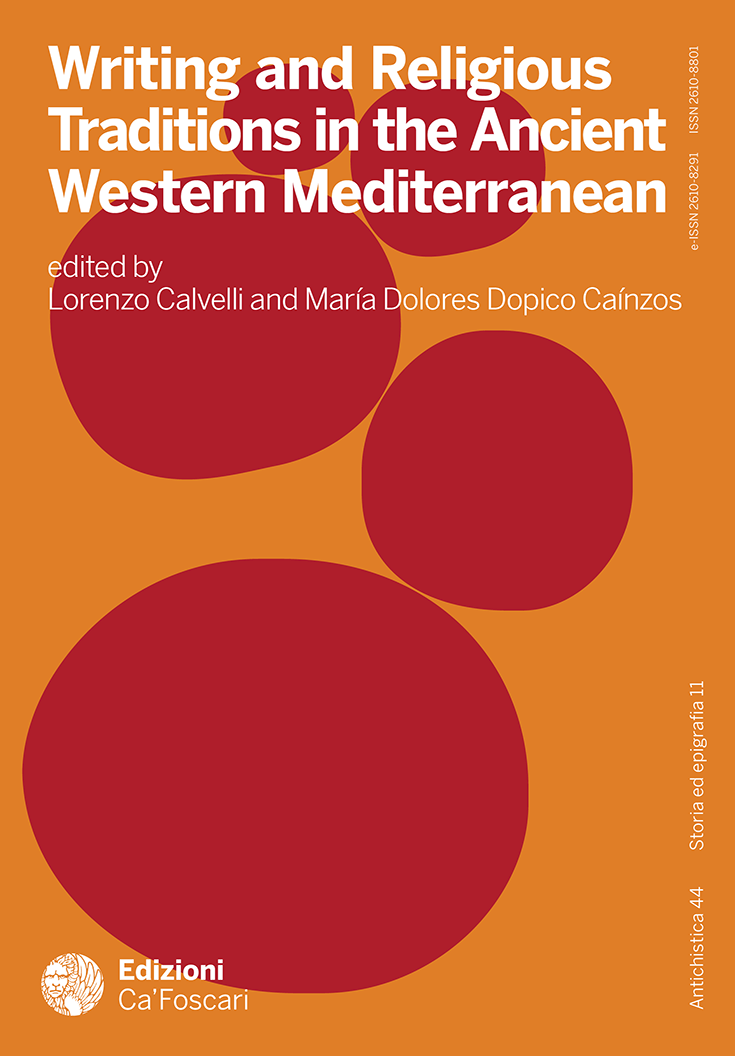
Writing and Religious Traditions in the Ancient Western Mediterranean
Sept. 24, 2025 -

L’edilizia Kura-Araxes tra IV e III millennio: uno studio regionale
June 24, 2025 -

The Akkadian Great Hymns and Prayers
Dec. 18, 2024 -

Modelling the Rhythm of Neolithisation Between the Carpathians and the Dnieper River
Dec. 6, 2024 -
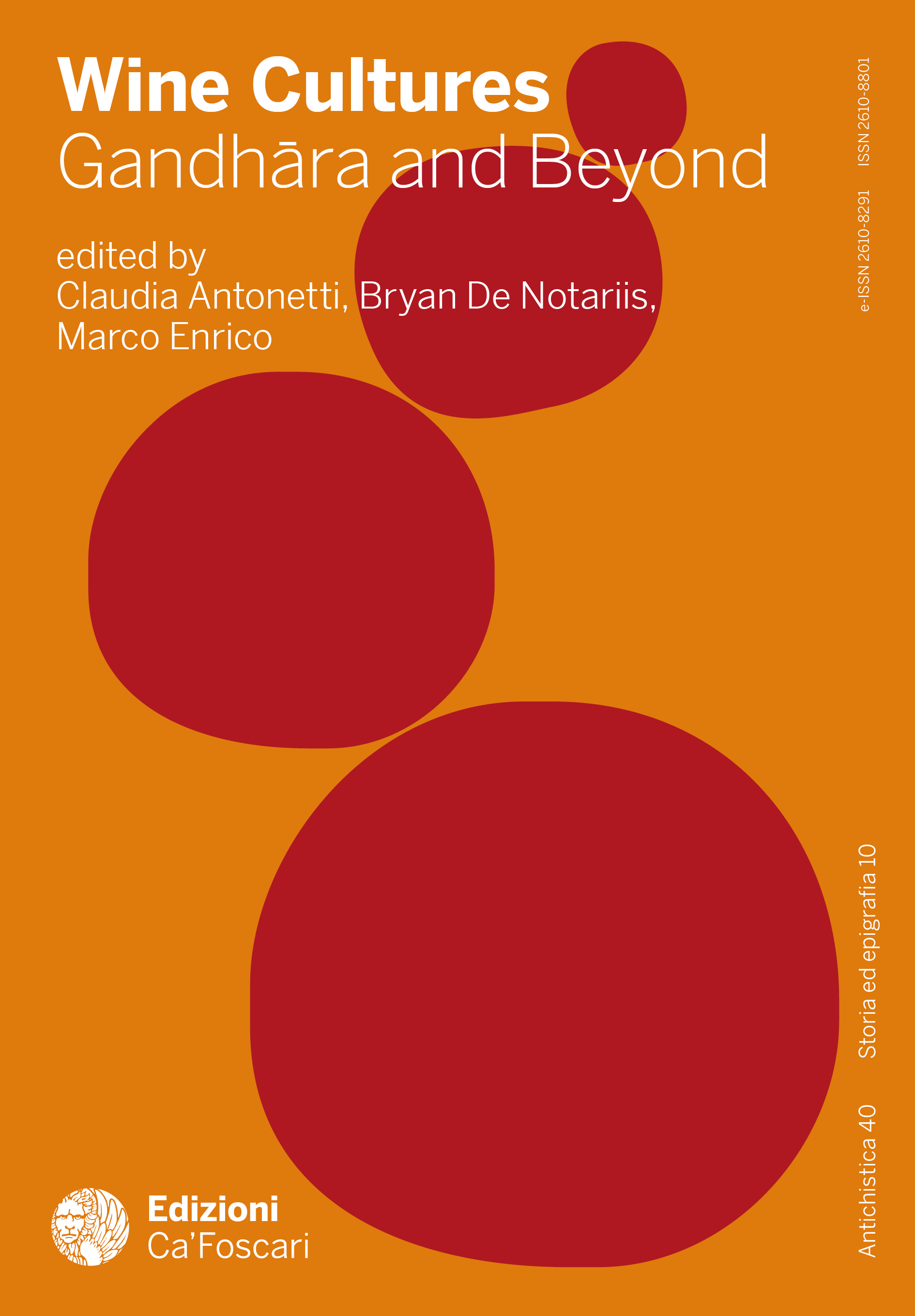
Wine Cultures
Oct. 8, 2024 -
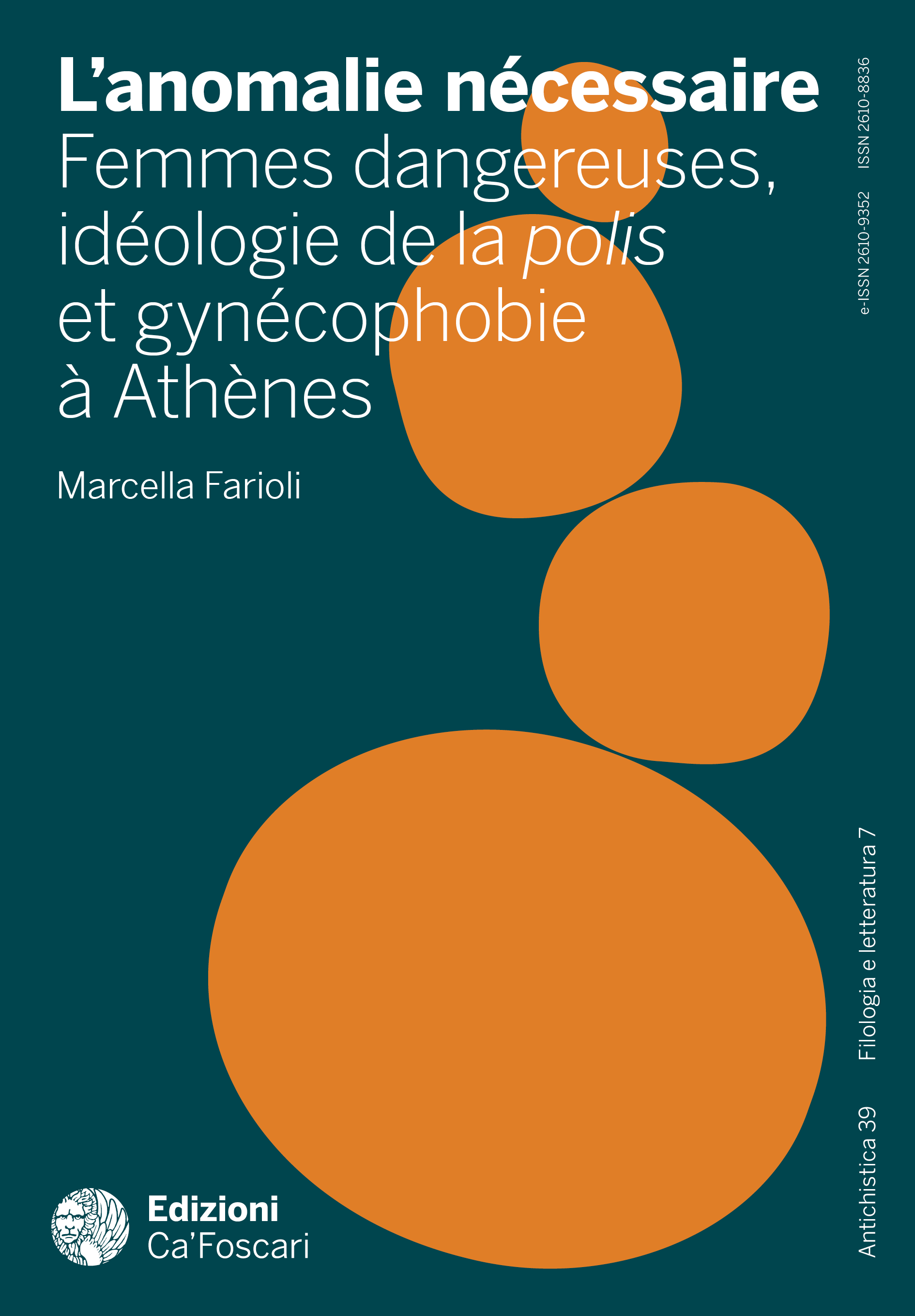
The Necessary Anomaly
July 18, 2024 -
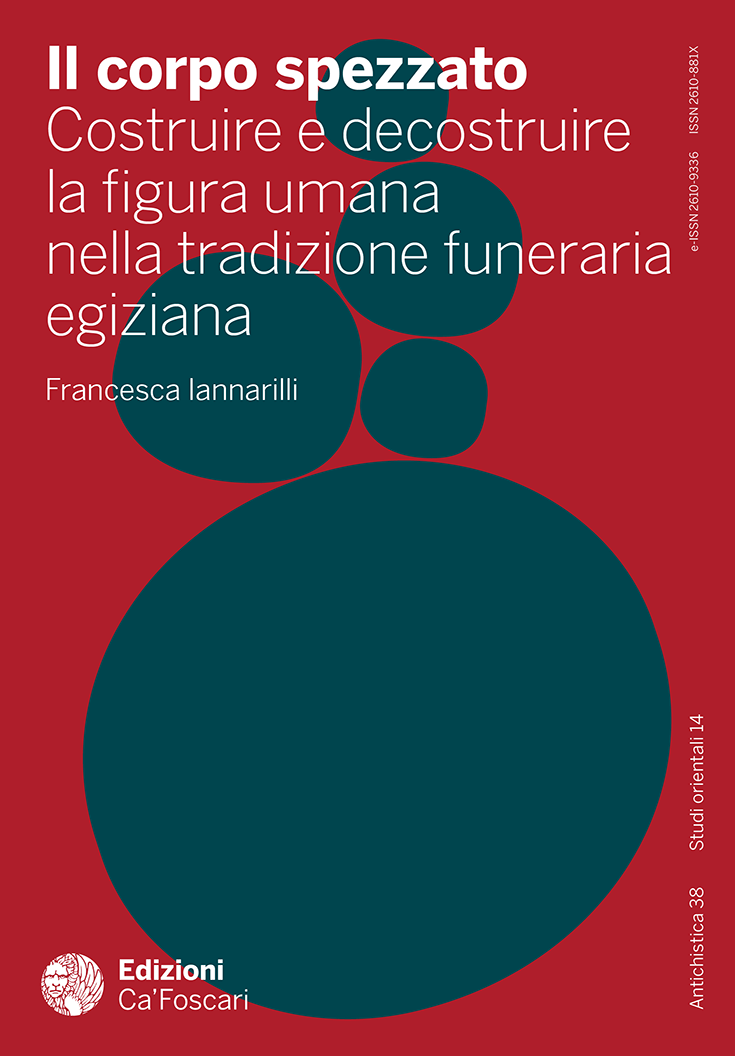
The Broken Body
June 24, 2024 -

Un monde partagé : la Sicile du premier siècle av. J.-C. entre Diodore et Cicéron
Dec. 19, 2023 -
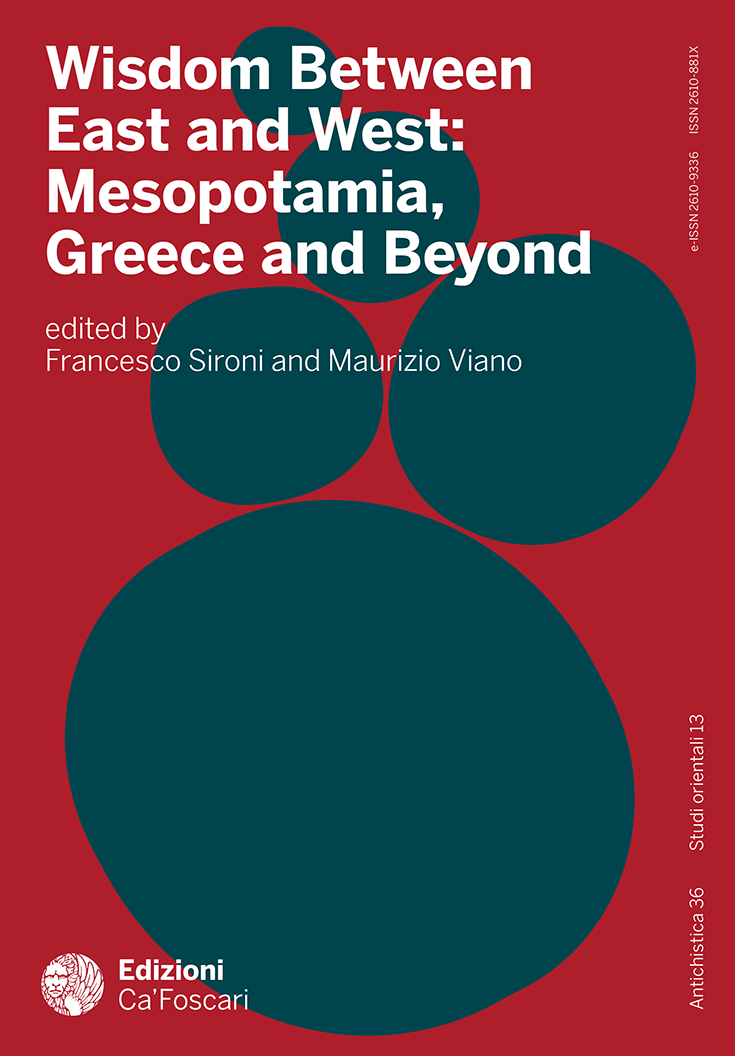
Wisdom Between East and West: Mesopotamia, Greece and Beyond
July 9, 2024 -

Opitergium Necropolis
May 30, 2023 -

Son of the Flash, Worthy of a King. A Veneto Horse and its Harness
Dec. 16, 2022 -

Libertatis dulcedo
Feb. 4, 2022 -
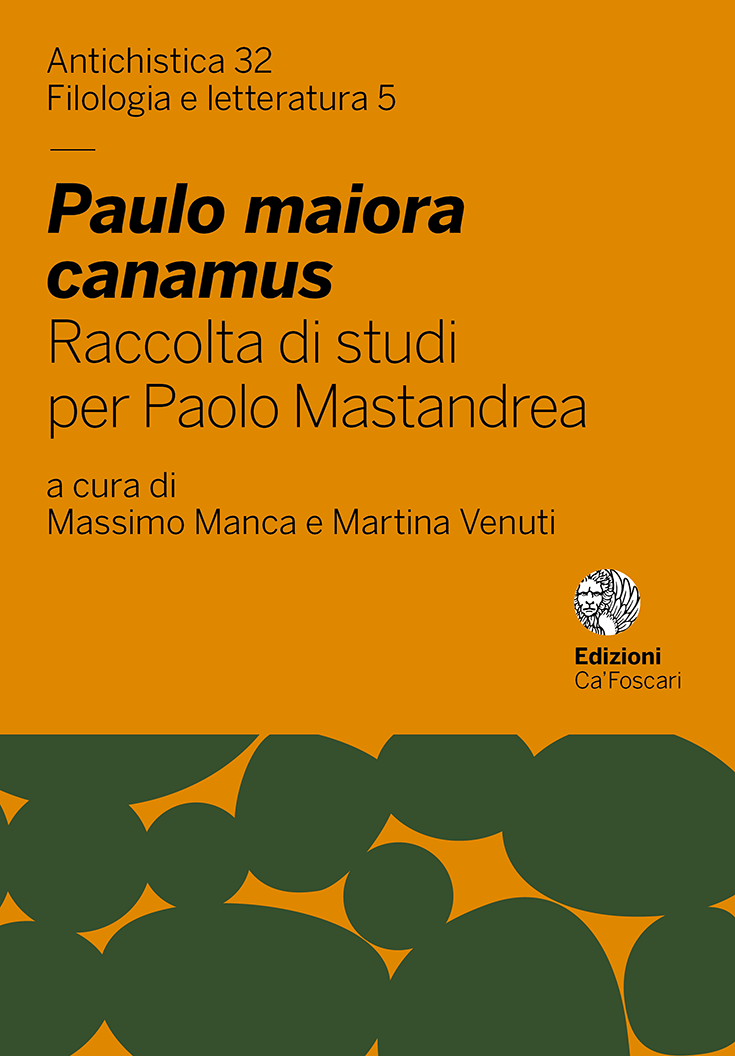
Paulo maiora canamus
Dec. 14, 2021 -

ΦΑΙΔΙΜΟΣ ΕΚΤΩΡ
Dec. 16, 2021 -

Headscarf and Veiling
Aug. 30, 2021 -

Stolen Heritage
March 31, 2021 -
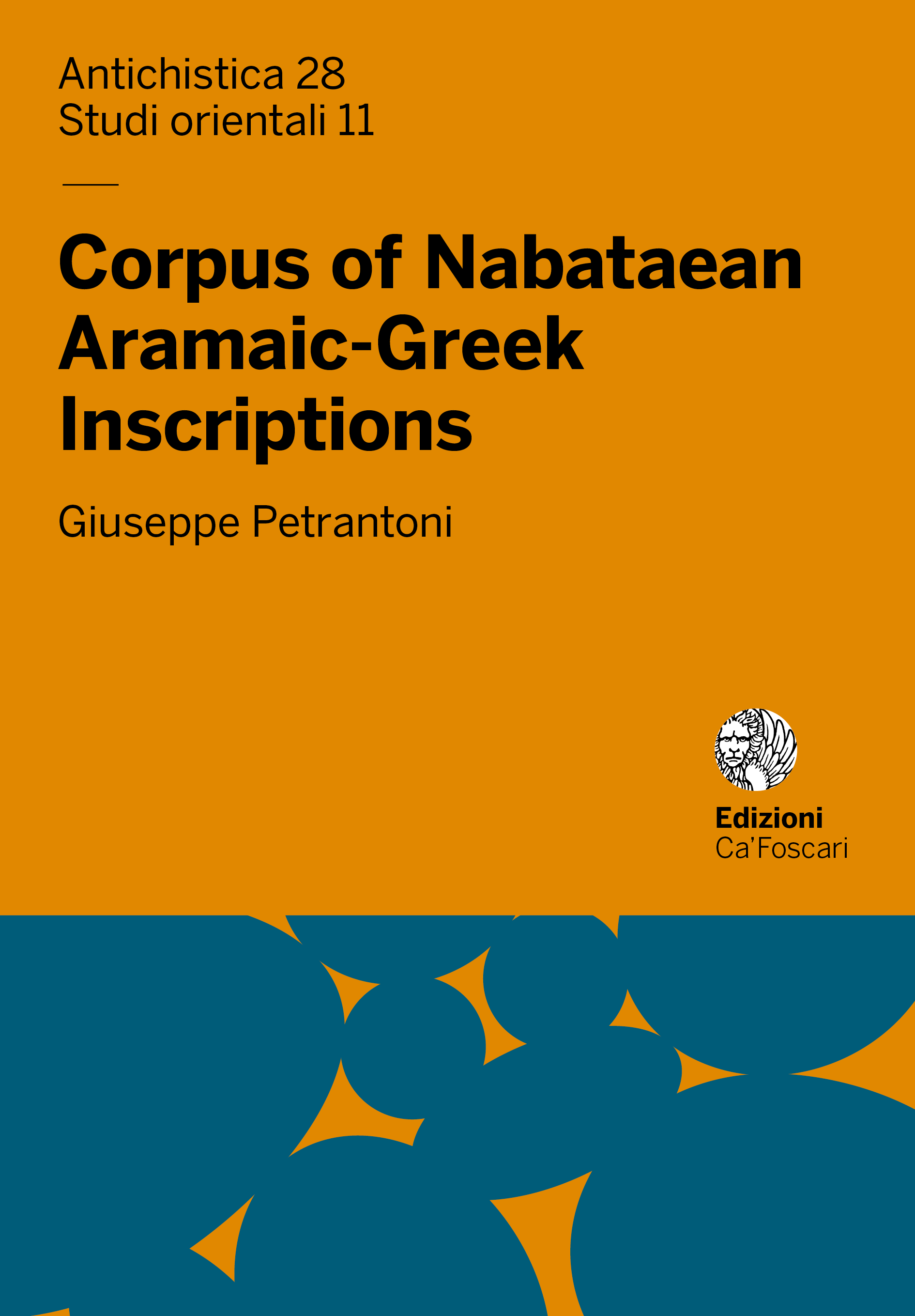
Corpus of Nabataean Aramaic-Greek Inscriptions
April 26, 2021 -

Administration at Girsu in Gudea’s Time
June 3, 2020 -
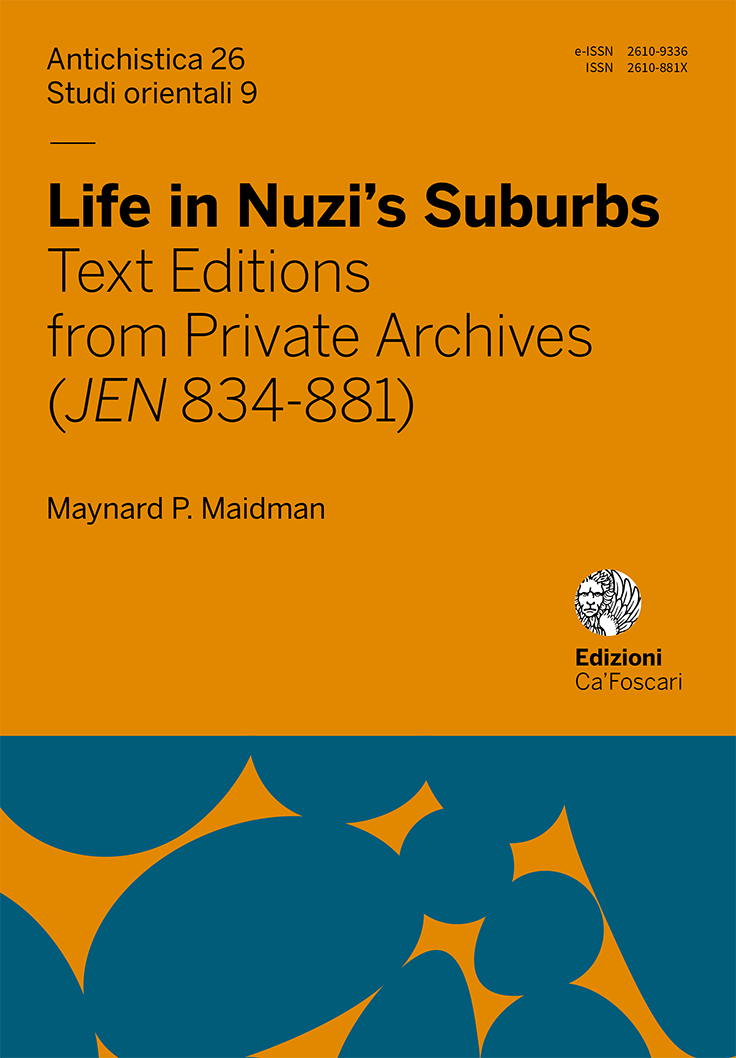
Life in Nuzi’s Suburbs
May 21, 2020 -
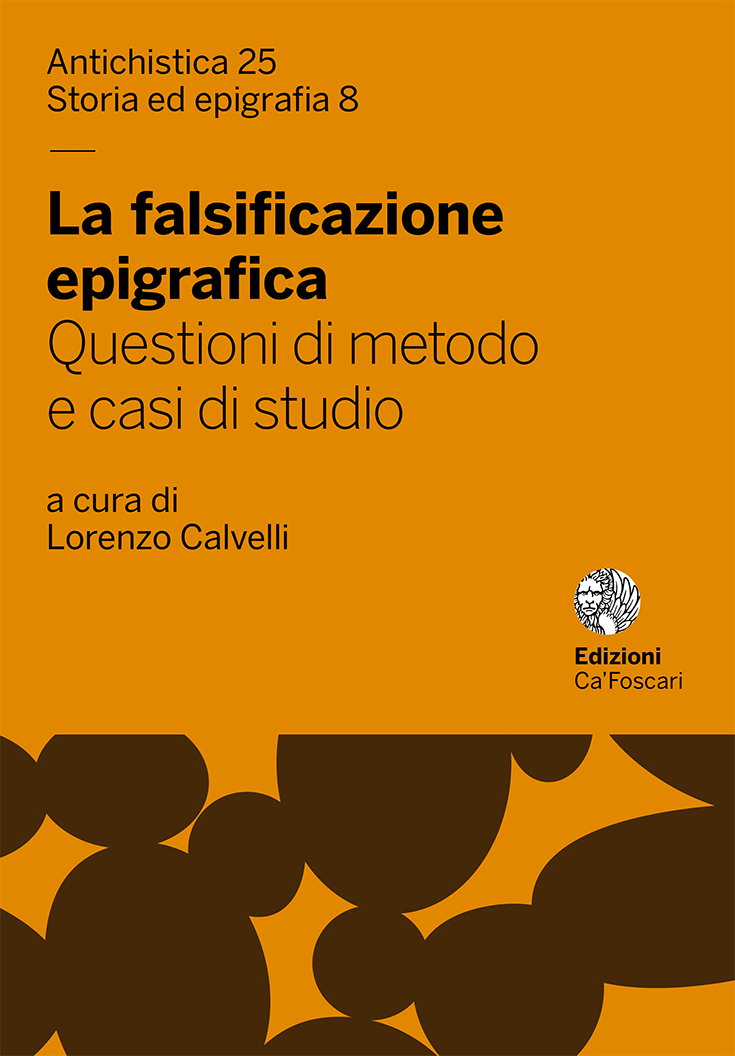
Epigraphic Falsification
Dec. 16, 2019 -

Altera pars laboris
Dec. 11, 2019 -

The Gift of Altino
Dec. 16, 2019 -
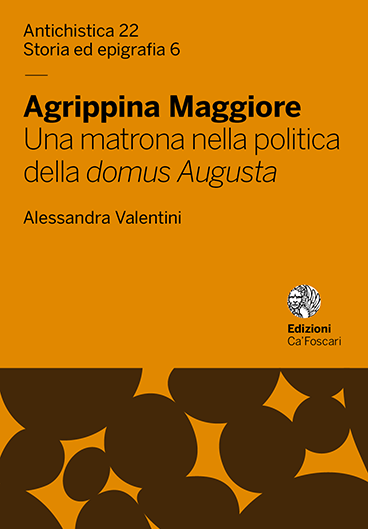
Agrippina Maggiore
Dec. 3, 2019 -

The Soul of Things
Nov. 23, 2019 -
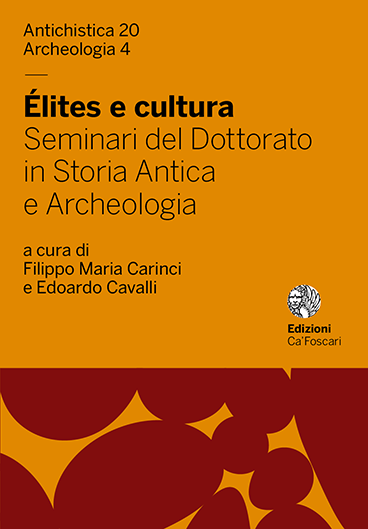
Elites and Culture
July 6, 2019 -
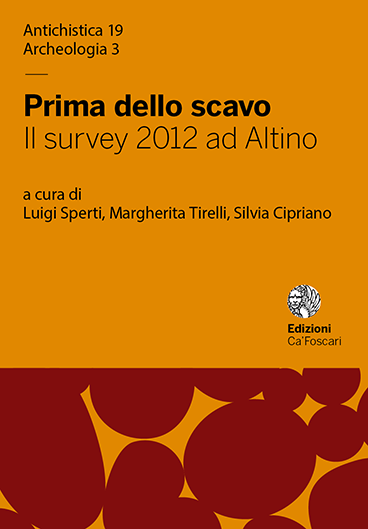
Before the Excavation
Nov. 20, 2018 -
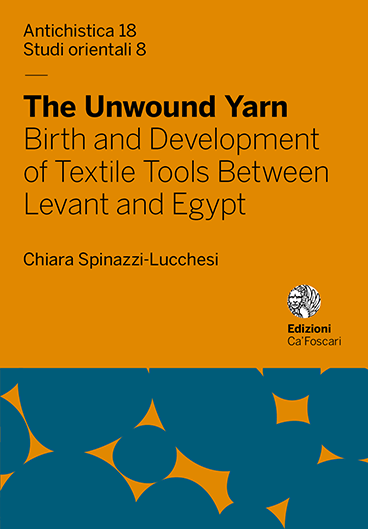
The Unwound Yarn
July 4, 2018 -

Personal Names in the Aramaic Inscriptions of Hatra
May 18, 2018 -
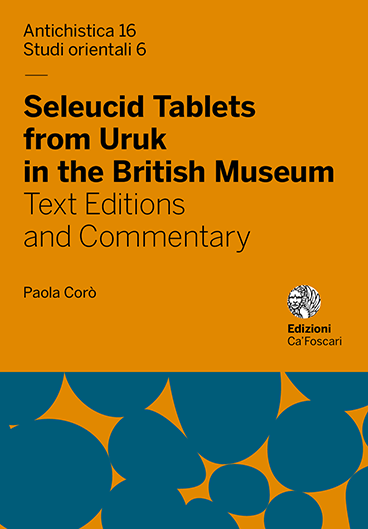
Seleucid Tablets from Uruk in the British Museum
April 5, 2018 -

Epigrafia ostiense dopo il CIL. 2000 iscrizioni funerarie
Jan. 26, 2023 -
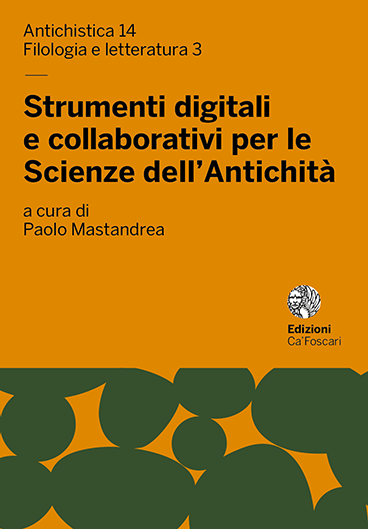
Digital and Collaborative Tools for Antiquity Studies
Nov. 29, 2017 -

Certissima signa
Sept. 1, 2017 -

The City of Ebla
June 13, 2017 -

Languages, Objects, and the Transmission of Rituals
July 12, 2017 -

The Protopalatial Building of the ‘Acropoli Mediana’ in Phaistos (Rooms CV-CVII)
March 1, 2017 -

The Reception of Sumerian Literature in the Western Periphery
July 8, 2016 -

Commensality and Ceremonial Meals in the Neo-Assyrian Period
Dec. 30, 2015 -

The She-Wolf on the Nile
Feb. 20, 2015 -

Egyptian Antiquities and Italy
Jan. 13, 2015 -

History and Stories of the Greek Language
Dec. 10, 2014 -

Powers and Legitimacy in the Ancient World
Nov. 25, 2014 -

Protopalatial Phaistos
Oct. 1, 2013 -

Aspects of the Ablaita Prepositional System
April 1, 2013 -

Microstories of Romanization
March 30, 2013
Lucio Milano, Università Ca’ Foscari Venezia, Italia
Advisory Board
Claudia Antonetti, Università Ca’ Foscari Venezia, Italia
Filippo Maria Carinci, Università Ca’ Foscari Venezia, Italia
Ettore Cingano, Università Ca’ Foscari Venezia, Italia
Joy Connolly, New York University, USA
Andrea Giardina, Scuola Normale Superiore, Pisa, Italia
Marc van de Mieroop, Columbia University in the City of New York, USA
Elena Rova, Università Ca’ Foscari Venezia, Italia
Fausto Zevi, Sapienza Università di Roma, Italia
Use the form to submit a proposal.
Submit a proposalinput
Dipartimento di Studi Umanistici
Palazzo Malcanton Marcorà
Dorsoduro 3484/D
30123 Venezia
The book processing charges are regulated by the Publisher. For more information please visit: Publish with us.
The series adopts double-blind peer review as its benchmark.
Therefore, the published works have obtained a favourable opinion from at least two evaluators who are experts in the field, through an anonymous review process (double-blind peer review) conducted under the responsibility of the Scientific Direction of the series. The reviewers have no direct contact with the authors and belong to research institutions other than the one to which the series is affiliated.
In rarer cases, the series may adopt other types of referencing processes, such as open review, i.e. a non-anonymous review, or a mixed review involving a member of the Scientific Committee and an external evaluator. These options are determined by the specific characteristics of the research subject of the publication, or by other peculiar factors that determine the greater effectiveness of the alternatives indicated here.
Every work published in Antichistica was accepted for publication by no less than two qualified reviewers as a result of a process of anonymous reviewing (double-blind peer review). The reviewers are independent of the authors and not affiliated with the same institution.
The Series’ Editor-in-Chief guarantees the proper execution of the peer review process for every book published in the Series.
Peer review policies for the different sections:
- Complete volume/issue: subject to peer review
- Monographs/essays/articles: subject to peer review
- Introductions, prefaces: no peer review
- Reviews: no peer review
- Editorials: no peer review
Ethical Code of Antichistica
Antichistica is a peer-reviewed scientific book series whose policy is inspired by the COPE (Committee on Publication Ethics) Ethical Code.
Publisher’s responsibilities
The Publisher must provide the Book Series with adequate resources and the guidance of experts, in order to carry out its role in the most professional way, aiming at the highest quality standard.
The Publisher must have a written agreement that defines the relationship with the owner of the Book Series and/or the Editor-in-Chief. The agreement must comply with the Code of Behavior for Publishers of Scientific Journals, as established by COPE.
The relationship among the Editor-in-Chief, the Advisory Board and the Publisher is based on the principle of publishing independence.
Editors’ responsibilities
The Editor-in-Chief and the Advisory Board of Antichistica alone are responsible for the decision to publish the submitted works.
Submitted works, after having been checked for plagiarism by means of the anti-plagiarism software Compilatio that is used by the University and is made available to us, will be sent to at least two reviewers. Final acceptance presumes the implementation of possible amendments, as required by the reviewers and under the supervision of the Antichistica Editor-in-Chief.
The Antichistica Editor-in-Chief and Advisory Board must evaluate each submitted paper in compliance with the Book Seriesʼ policy, i.e. exclusively on the basis of its scientific content, without discrimination of race, sex, gender, creed, ethnic origin, citizenship, or the scientific, academic and political position of the Authors.
Allegations of misconduct
If the Antichistica Editor-in-Chief and Advisory Board notice (or receive notifications of) mistakes or inaccuracies, conflict of interest or plagiarism in a published book, they will immediately warn the Author and the Publisher and will undertake the necessary actions to resolve the issue. They will do their best to correct the published content whenever they are informed that it contains scientific errors or that the authors have committed unethical or illegal acts in connection with their published work. If necessary, they will withdraw the book or publish a recantation.
All complaints are handled in accordance with the guidelines published by the COPE.
Concerns and complaints must be addressed to the following e-mail ecf_support@unive.it. The letter should contain the following information:
- complainant’s personal information;
- title, author(s), publication date, DOI;
- complaint(s);
- declaration that the complainant has no conflict of interest, or declaration of an actual or potential conflict of interest.
Authors’ responsibilities
Stylesheet
Authors must follow the Guidelines for Authors to be downloaded from the Antichistica website.
Authors must explicitly state that their work is original in all its parts and that the submitted paper has not been previously published, nor submitted to other publishers, until the entire evaluation process is completed. Since no paper or book gets published without significant revision, earlier dissemination in conference proceedings or working papers does not preclude consideration for publication, but Authors are expected to fully disclose publication/dissemination of the material in other closely related publications, so that the overlap can be evaluated by the Antichistica Editor-in-Chief.
Authorship
Authors are strongly encouraged to use their ORCID iD when submitting a manuscript. This will ensure the authors’ visibility and correct citation of their work.
Authorship must be correctly attributed; all those who have given a substantial contribution to the design, organisation and accomplishment of the research the book is based on, must be indicated as Co-Authors. Please ensure that: the order of the author names is correct; the names of all authors are present and correctly spelled, and that affiliations are up-to-date.
The respective roles of each co-author should be described in a footnote. The statement that all authors have approved the final version should be included in the disclosure.
Conflicts of interest and financing
Authors, under their own responsibility, must avoid any conflict of interest affecting the results obtained or the interpretations suggested. The Antichistica Editor-in-Chief will give serious and careful consideration to suggestions of cases in which, due to possible conflict of interest, an Author’s work should not be reviewed by a specific scholar. Authors should indicate any financing agency or the project the book stems from.
Quotations
Authors must see to it that all works consulted be properly quoted. If works or words of others are used, they have to be properly paraphrased or duly quoted. Quotations between “double quotes” (or «angled quotation marks» if the text is written in a language other than English) must reproduce the exact wording of the source; under their own responsibility, Authors should carefully refrain from disguising a restyling of the source’s wording, as though it was the original formulation.
Any form of excessive, inappropriate or unnecessary self-citation, as well as any other form of citation manipulation, are strongly discouraged.
Ethical Committee
Whenever required, the research protocols must be authorised in advance by the Ethical Committee of Ca’ Foscari University of Venice.
Emendations
When Authors find a mistake or an inaccuracy in their own work, they must immediately warn the Antichistica Editor-in-Chief, providing all the information needed to make the due adjustments.
Reviewers’ responsibilities
Goal
By means of the peer-review procedure, reviewers assist the Antichistica Editor-in-Chief and Advisory Board in taking decisions on the submitted works. They are expected to offer the Authors suggestions as to possible adjustments aimed at improving their contribution submission.
Timing and conflicts of interest
If a reviewer does not feel up to the task of doing a given review, or if she/he is unable to read the work within the agreed schedule, she/he should notify the Antichistica Editor-in-Chief. Reviewers must not accept texts for which there is a conflict of interest due to previous contributions or to a competition with a disclosed author (or with an author they believe to have identified).
Confidentiality
The content of the reviewed work must be considered confidential and must not be used without explicit authorisation by the Author, who is to be contacted via the editor-in-chief. Any confidential information obtained during the peer review process should not be used for other purposes.
Collaborative attitude
Reviewers should see themselves not as adversaries but as advocates for the field. Any comment must be done in a collaborative way and from an objective point of view. Reviewers should clearly motivate their comments and keep in mind the Golden Rule of Reviewing: “Review for others as you would have others review for you”.
Plagiarism
Reviewers should report any similarity or overlapping of the work under analysis with other works known to them.